5 Body Signs of Nutritional Deficiencies
Nutritional deficiencies gone undetected or without cause for alarm over long periods can lead to life-altering health complications. Different areas of your body can present with signs signaling to you that something is physiologically wrong. Being in tune with your body’s needs and aware of these signs of nutritional deficiencies is critical to whole body wellness.
Optimal vitamins and minerals are required by the body to properly eliminate toxins from the body, and promote the health needs of your digestive system, cardiovascular system, metabolism, and total body strength. Signs can be both external and internal, and can be caused by the overconsumption of one vitamin or mineral, which can leave your body out of balance and deficient in another mineral.
Learn these 5 body signs of nutritional deficiencies so that you can better detect how your body is functioning and enable you to heal faster if you notice something is wrong. These small signs today are fixable and can prevent you from long term health problems.
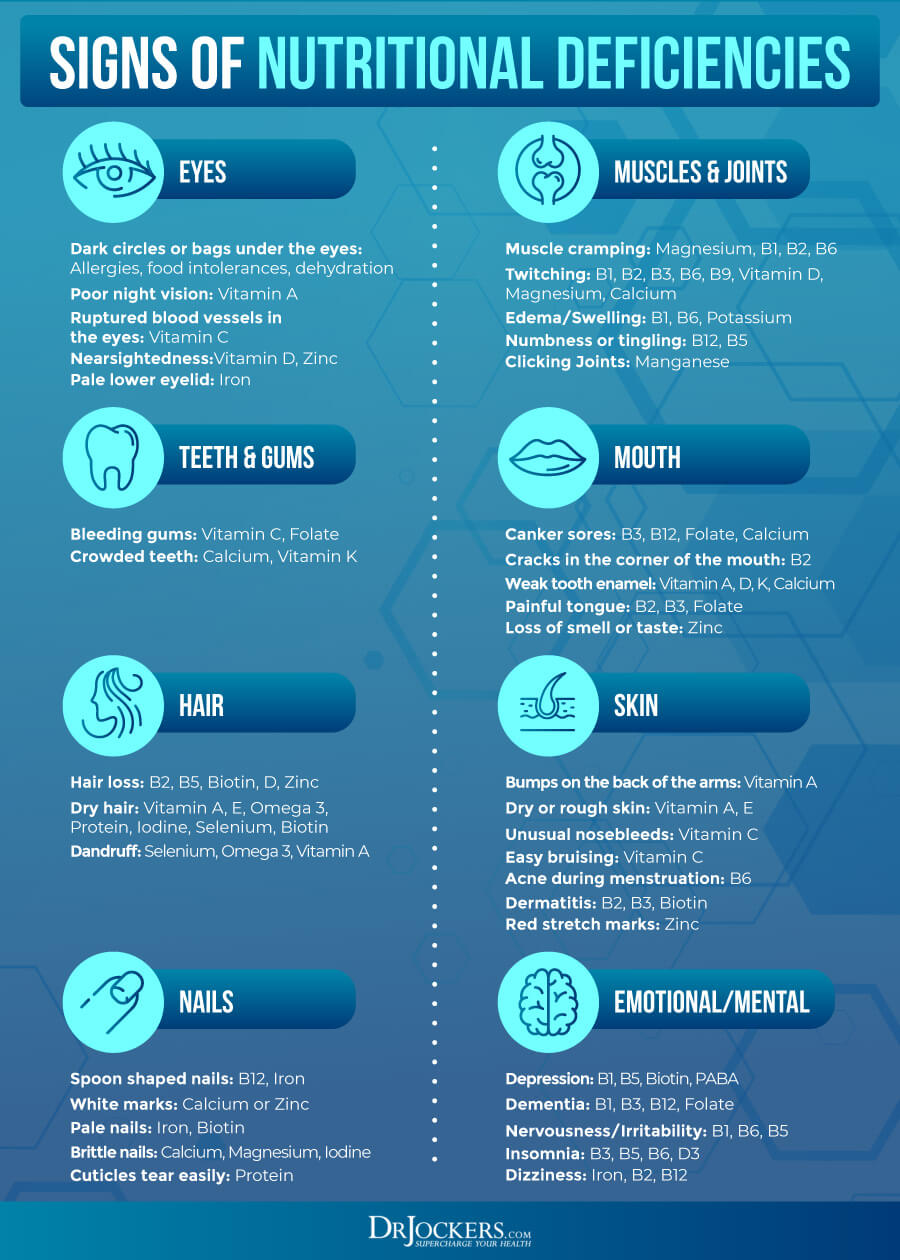
Sign #1: Hair Loss and Skin Rash
Nutritional deficiencies affect a person’s entire life. Not only do these nutritional deficiencies lead to a decline in physical health, but many problems influence an individual’s ability to maintain a quality work and social life.
Hair loss and face rashes may impact one’s desire to feel comfortable in public settings and may be the first indicator that there is a hormonal imbalance or other physiological concern stemming from inadequate nutrient intake.
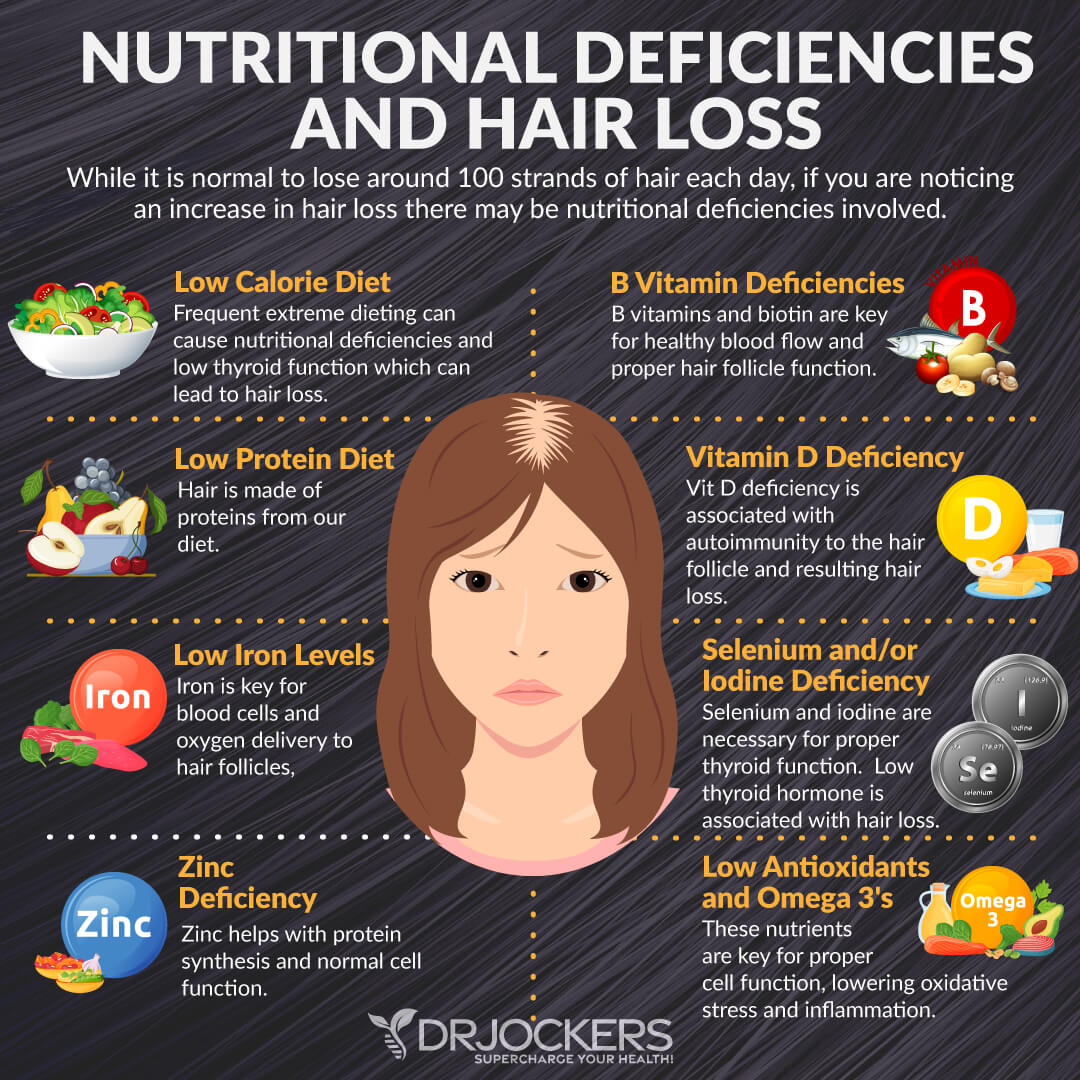
Related Nutritional Deficiencies
The body is unable to store the water-soluble B7 vitamin called biotin. This makes it critical for a steady supply of biotin to be delivered to the body for optimal levels. Biotin is involved in several essential enzymatic reactions necessary for the metabolism of glucose and amino acids and is especially critical in omega fatty acid metabolism (6, 7).
When biotin levels are depleted, a deficiency can result in alopecia or the loss of hair follicles in spots or patches on the head and body. Biotin deficiency is also associated with the appearance of an inflammatory skin condition characterized by a scaly, red rash around the body’s orifices. Biotin deficiency is a key player in individuals with chronic liver diseases and is a sign that should not go untreated, especially during infancy and early childhood. (6, 7)
You can test for a biotin deficiency through an organic acid test
Remedy
Treatment for biotin deficiency lies in understanding a variety of potential causes and preventing the problem. Individuals who take anticonvulsant drugs and antibiotics are susceptible to biotin deficiency. Avoiding antibiotic treatment when possible is an essential strategy to maintaining biotin levels and supporting one’s health. (7)
Other individuals with intestinal malabsorption complications, such as those with leaky gut syndrome or another inflammatory gut disorder, should consider treatment to repair the intestinal tract and improve the ability of cells to receive biotin and other nutrients.
Eggs contain a protein called avidin that, when consumed raw, inhibits the ability of the body to effectively absorb biotin. Cooking eggs destroys the avidin protein, disabling it from affecting biotin absorption. Eat foods rich in biotin, such as organ meats, eggs, beef, raspberries, nuts, mushrooms, avocados, cauliflower, fish, and seafood.
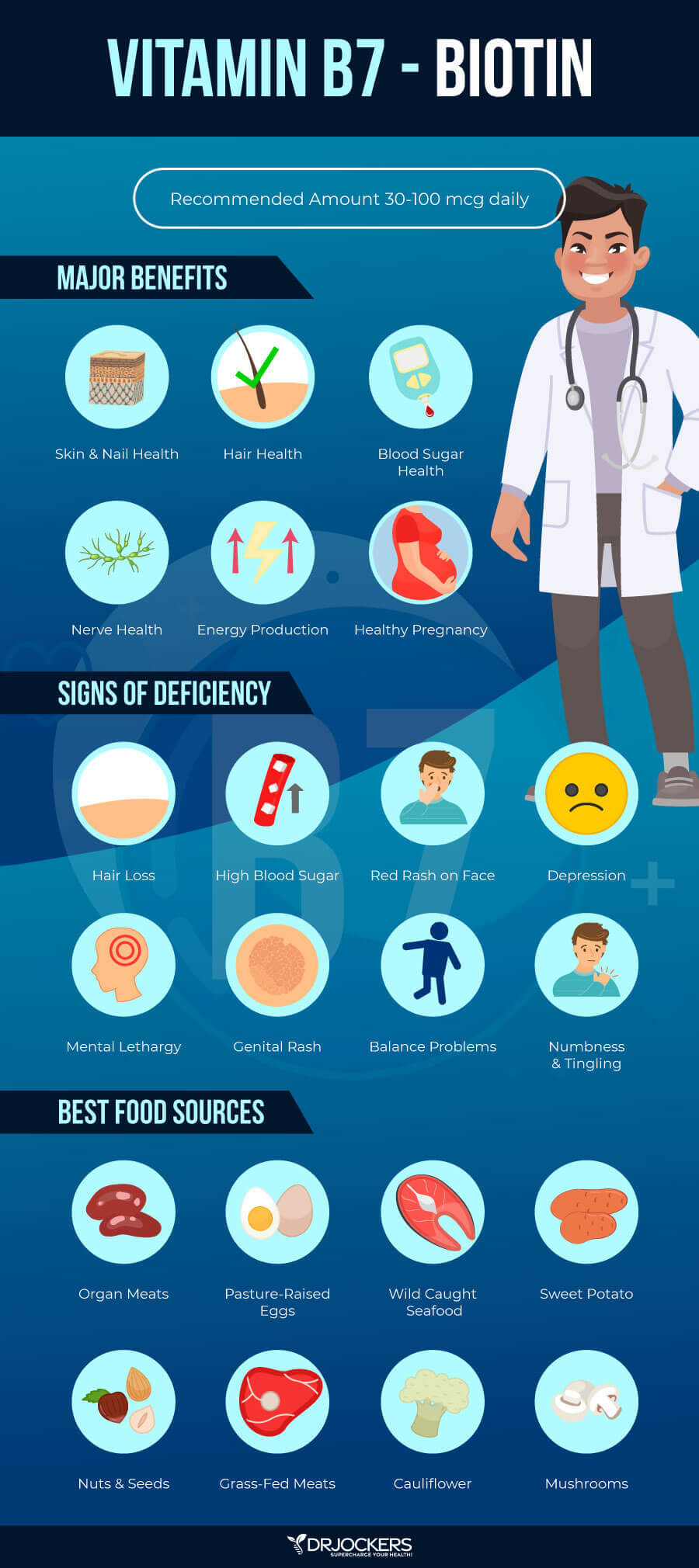
Supplements:
When working with clients, I often see low biotin levels using a home urine test called the organic acid test. When biotin levels are low, I almost always see other B vitamins low, such as B2, B6, folate, and often B12. I use a methylated B vitamin supplement that has the preactivated forms of all the B vitamins to help improve the utilization rate of the nutrients.
For general maintenance, a supplement with 300-400 mcg (100-133% of RDA) of biotin daily is great. For slight deficiencies of biotin, I use 1 cap of B Strong – 2 times daily, which provides 800 mcg altogether, 266% of the RDA. For advanced cases of extreme biotin deficiency, I will suggest supplementing with 2500-5000 mcg daily.
Sign #2: Oral Health Problems
Oral health reflects the relationship you have with consuming proper nutrients in your diet, considering many vitamins and minerals are responsible for protecting the oral cavity. Nutritional deficiencies can manifest in various ways in the oral cavity and develop into more severe health challenges down the road. For instance, consider the following nutrients and their effects on supporting structures in the oral cavity: (1, 2, 3, 4, 5)
- Vitamin A & D: Supports tooth enamel formation and oral epithelium, aids in absorption of calcium and phosphorus deposits in teeth, assists in wound healing, and supports salivary gland function.
- Vitamin C: Fights infection, speeds up healing due to stress on the tooth cavity and gums, supports dentin and collagen formation, and aids in calcium and iron absorption.
- Vitamin B2 (Riboflavin) & Vitamin B3 (Niacin): Aids in the breakdown of carbs, proteins, fat, and ketone bodies.
- Vitamin B1 (Thiamine): Helps convert energy from carbohydrates.
- Vitamin B6: Aids in the synthesis of red blood cells and assists in the metabolism of proteins, fats, and carbs.
- Vitamin B12: Supports gum health and wound healing.
- Iron: Supports salivary gland function, supports tooth, tongue, and gum structure, regulates inflammation, and is associated with the ability to taste
- Zinc: The role involving zinc’s therapeutic effects on oral health is unclear, but it is an important mineral essential for a healthy immune response and prevention of complications to the tongue
These symptoms of nutritional deficiencies are often associated with vegetarians who do not consume enough essential nutrients through diet because animal products contain many of the fat-soluble vitamins needed to maintain oral health (1).
Individuals are also susceptible to nutritional deficiencies, in which symptoms manifest in the oral cavity include people with gastrointestinal diseases, thyroiditis, autoimmune disorders, and people who consume proton inhibitor medications (3).
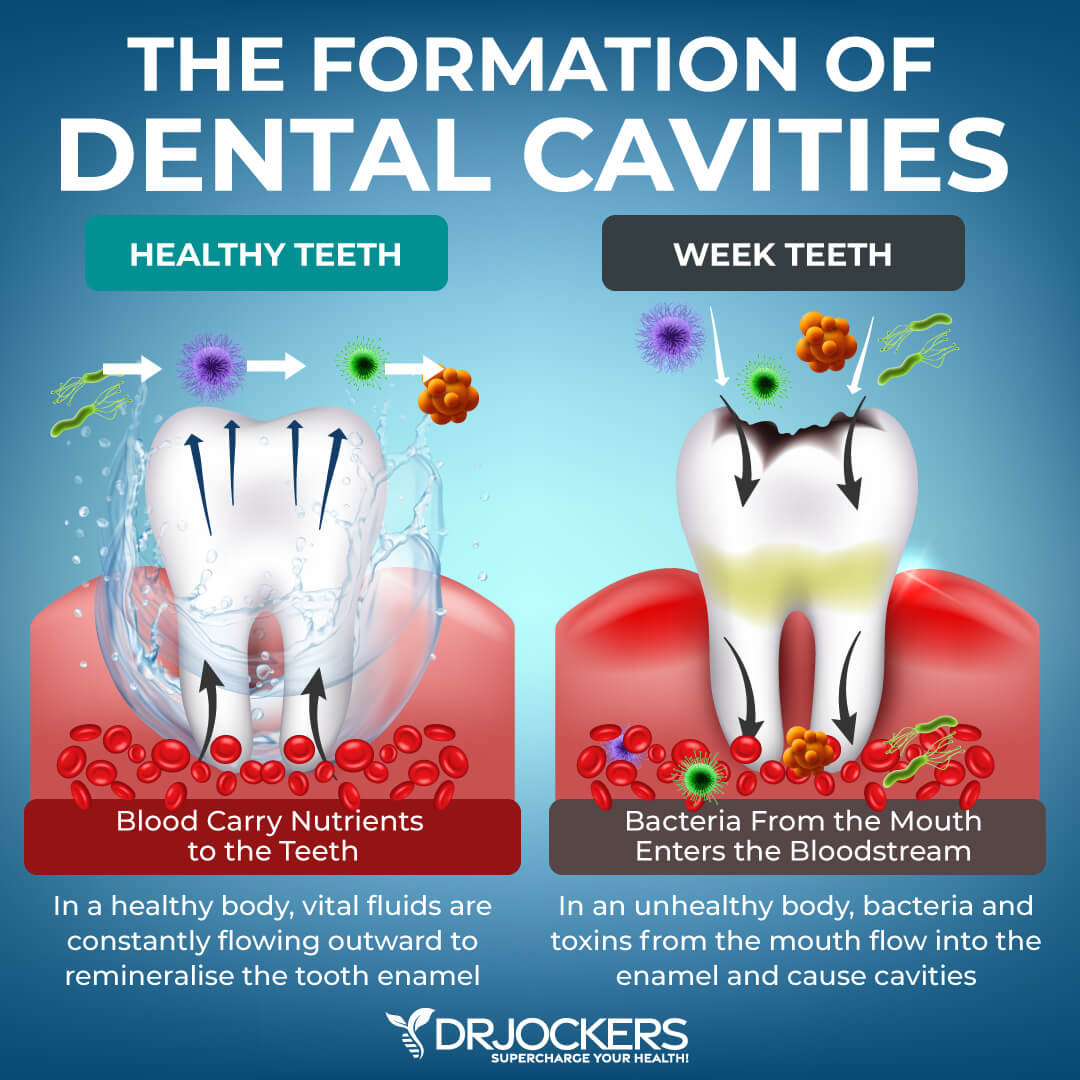
Related Deficiencies
Common vitamins and minerals associated with poor oral health include a complex of B vitamins, including riboflavin (B2), B12, and niacin (B3), as well as minerals like iron and zinc. The effects of nutritional deficiencies for each nutrient listed above can result in the following problems: (1, 2, 3, 4, 5)
- Vitamin A & D: Deficiency results in thinning enamel
- Vitamin C: Deficiency leads to bleeding gums and slow wound healing associated with gingivitis.
- Vitamin B2 (Riboflavin) & Vitamin B3 (Niacin): Deficiency causes inflammation of the tongue, cracked lips, and burning or dryness of the oral cavity.
- Vitamin B1 (Thiamine): Deficiency results in cracked lips and inflammation of the mouth, such as a burning tongue or muscle weakness.
- Vitamin B6: Deficiency can lead to a burning sensation in the mouth and periodontal disease.
- Vitamin B12: Deficiency can cause inflammation in the oral cavity, ulcers in the mouth, and periodontal disease.
- Iron: Deficiency causes inflammatory conditions of the mouth, anemia, painful and burning sensations of the tongue, as well as dysfunction of the salivary gland
- Zinc: Deficiency can cause BMS or burning mouth syndrome
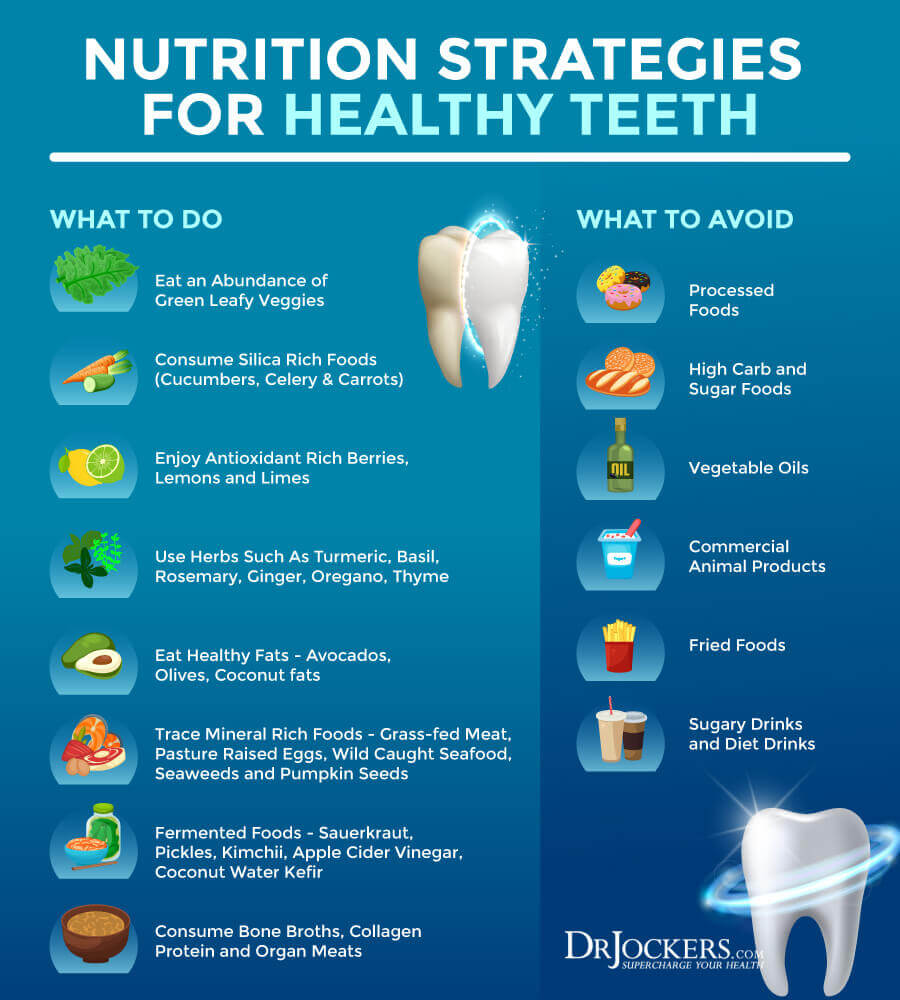
Remedy
Nutritional deficiencies in any of these nutrients can result in weakened immunity and a higher risk for infection. Unless you have specific dietary restraints, excellent protein sources containing iron, zinc, and B vitamins are found in wild caught salmon and tuna, free-range poultry, and organic and free-range sourced eggs.
Watch out for phytate containing foods such as grains, legumes, and nuts. These phytic acids bind to minerals like zinc and iron and reduce our ability to absorb them. Soaking and sprouting nuts and seeds removes the phytic acids and enhances the bioavailability of the nutrients in the nuts or seeds. Additionally, be sure to use fermented foods, which have a higher amount of B vitamins and good bacteria, and enzymes to enhance the digestive process.
Add more vegetables to your diet high in vitamin C to boost the availability of iron in the body. Such foods include kale, cruciferous vegetables like cauliflower and broccoli, tomatoes, red bell peppers, and citrus fruits like lemons and limes. Especially if you follow a specific diet, it is crucial to receive B vitamins from foods like avocados and dark leafy green vegetables.
The infographic below has some additional helpful nutrition tips to improve your oral health.
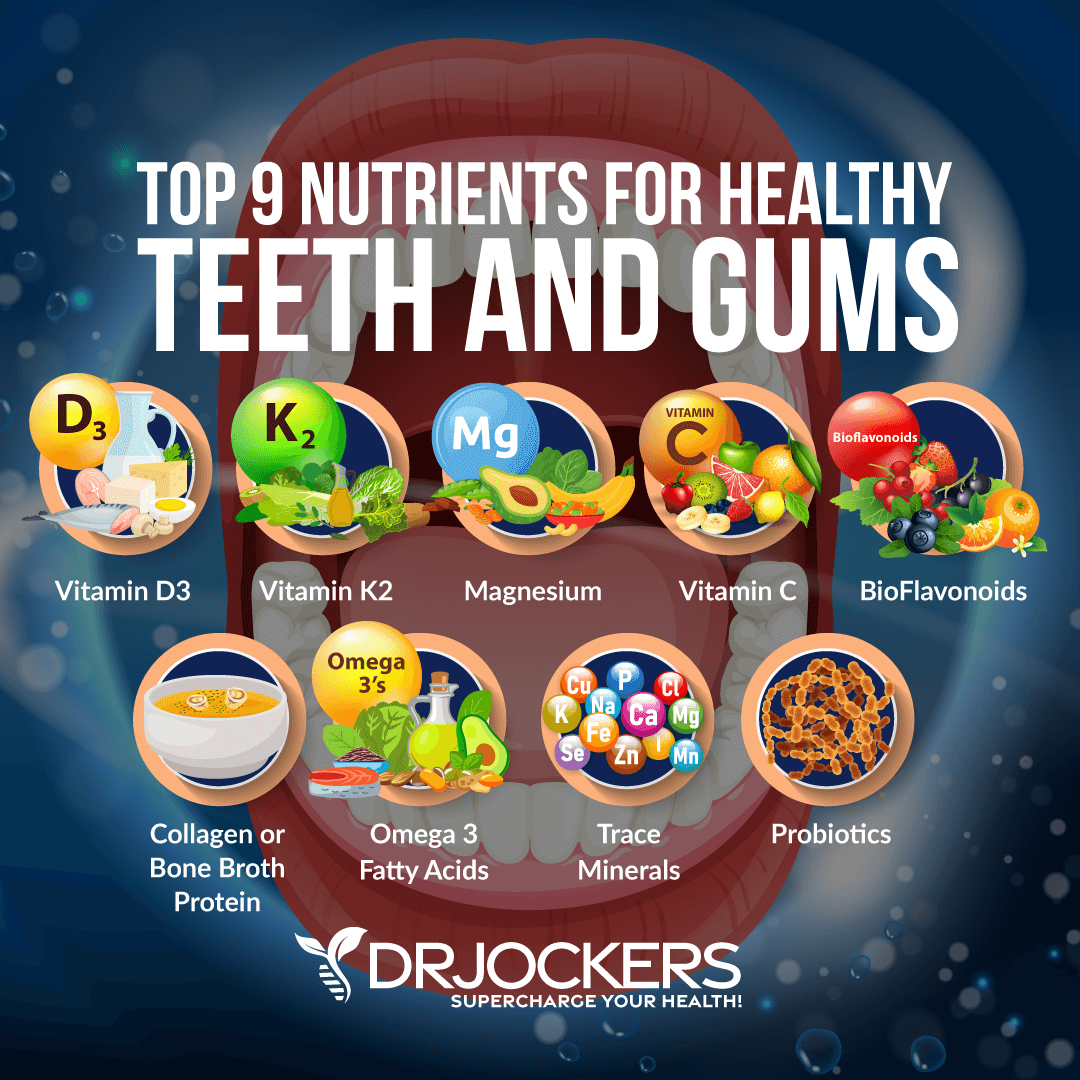
Sign #3: Muscular Cramps in Legs
Frequent muscle cramping in the calves, arches of the feet, and a stabbing sensation in your toes may be a sign that you are deficient in one of the critical nutrients that work in balance to control other ions.
You may just be working up a sweat more often than before, which increases your loss of electrolytes. However, whether your cramps occur over short- or long-term periods, this symptom should be treated accordingly.
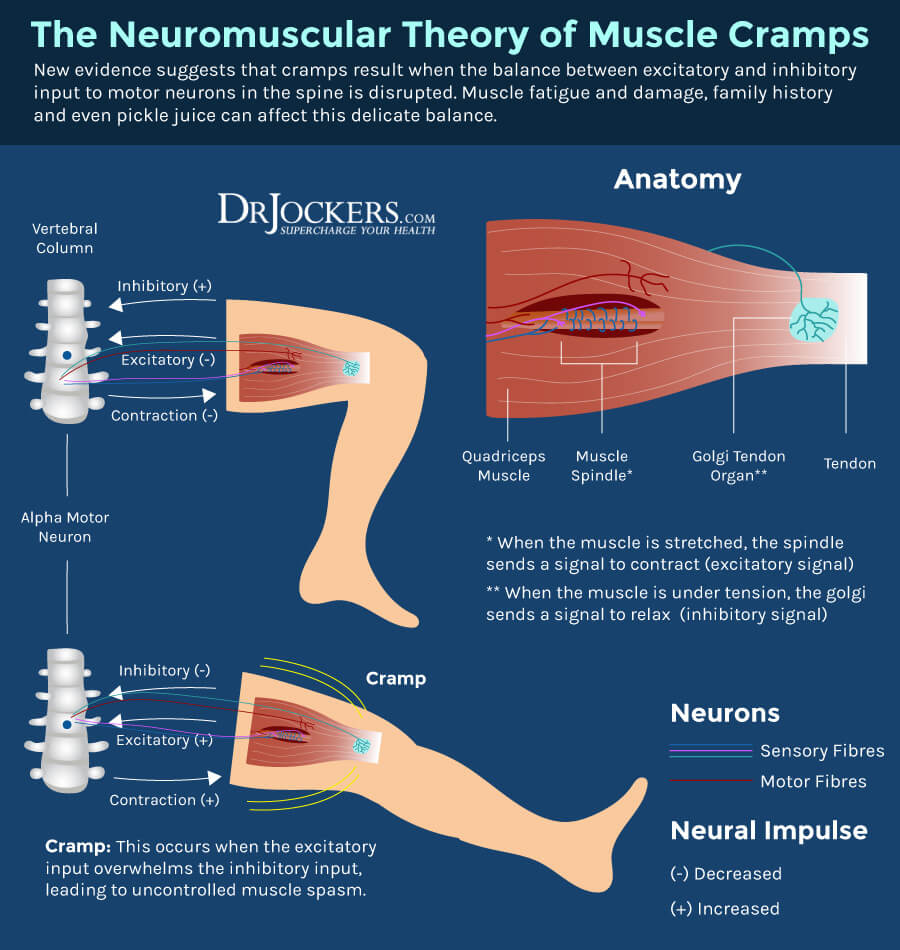
Related Deficiencies
Magnesium deficiency is one of the most common nutrient we are deficient in. It is also one of the most critical minerals in supporting healthy nerve function in the body, aiding in muscle relaxation and contraction, and acting as an electrolyte in bodily fluids, amongst other life-giving functions. Depleted magnesium levels can lead to an imbalance in calcium ion channels throughout the body, which manifests in a number of health symptoms. (8)
Along with magnesium, a potassium deficiency can cause cramping in leg muscles. Potassium is also involved in maintaining the integrity of cellular fluid and works closely with other minerals like calcium to support nerve function and smooth muscle tone (10).
Inadequate calcium absorption or deficiency may also be to blame for those tight muscles. Calcium is involved in muscle contractions and assists in generating nerve impulses.
Vitamin D is critical to regulating and increasing the absorption of calcium and may be an underlying cause or another underlying issue of your calcium deficiency. However, because the three nutrients play a role in preventing muscle cramping, any one deficiency in magnesium, potassium, or calcium should not be ruled out. (12)
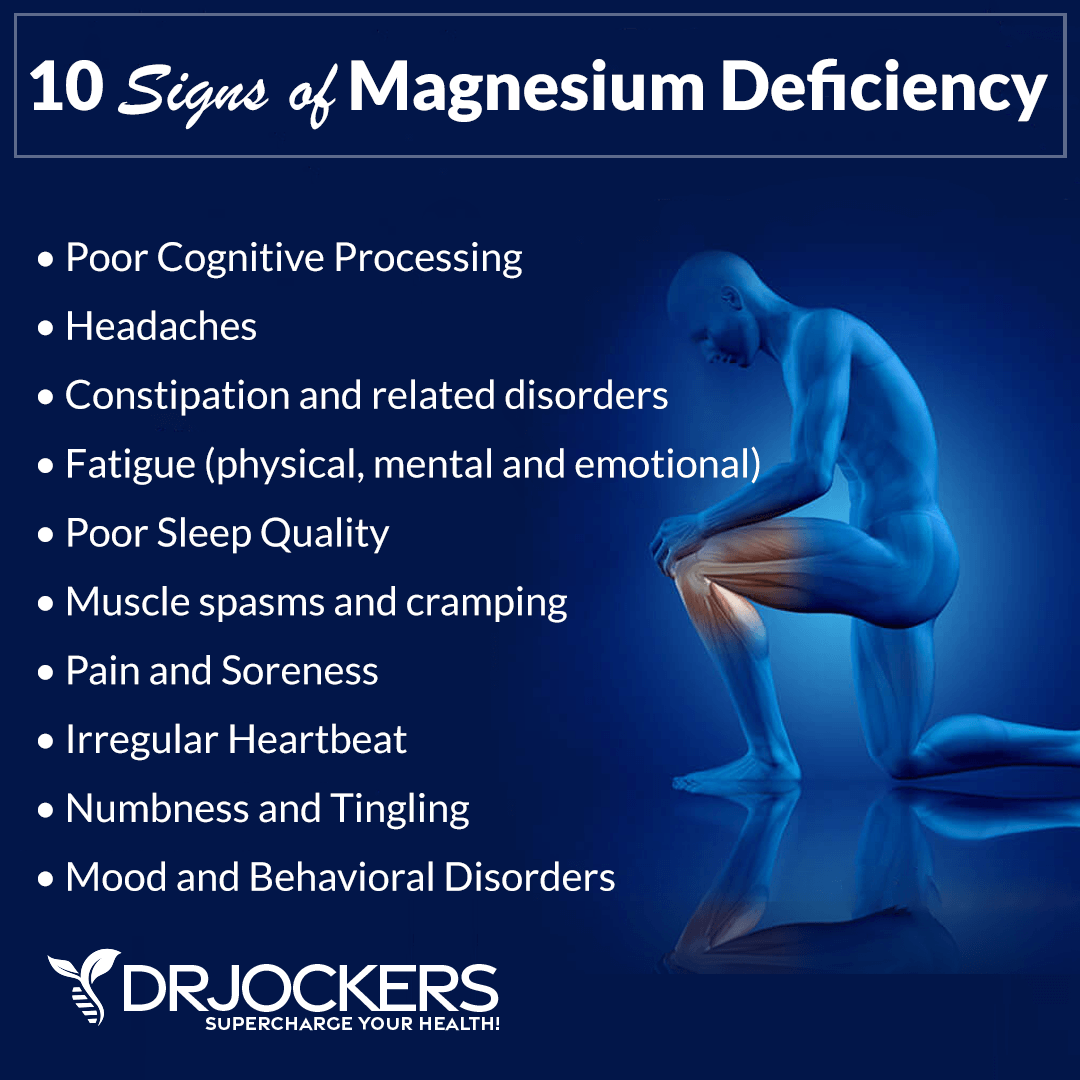
Remedy
Excellent sources of magnesium in foods are found in avocados, pumpkin seeds, and unsweetened cacao, while Brazil nuts and almonds contain high amounts of both magnesium and potassium (9, 11). Both calcium and magnesium can be received in combination with a healthy ratio of vitamin D3 to regulate calcium absorption in fermented foods like kefir, yogurt, and milk from 100% grass-fed animals. Coconut water and coconut water kefir are great sources of potassium.
The most effective combination I have found includes doing 3 Epsom salt baths each week, 3 days of sunbathing for at least 30 minutes with 40% or more of the body getting high quality sun exposure (or taking 10,000 IU of vitamin D3/K2 daily), using fermented foods and drinks like coconut water kefir and avocado daily.
In addition, I recommend using generous amounts of pink Himalayan salt on food and hydrating well throughout the day. Consume some dark green leafy veggies each day for calcium and antioxidants.
Many essential oils have natural antispasmodic qualities, which help inhibit problems associated with spasms, cramps, and muscle pulls. Some good ones include lavender, chamomile, rosemary, or cypress. You can massage these onto your legs, diffuse them in your home, and put them into your Epsom salt bath.
Finally, for individuals under more stress, I recommend doing 1-2 scoops of Brain Calm Magnesium in water daily. I have found this protocol to work great!
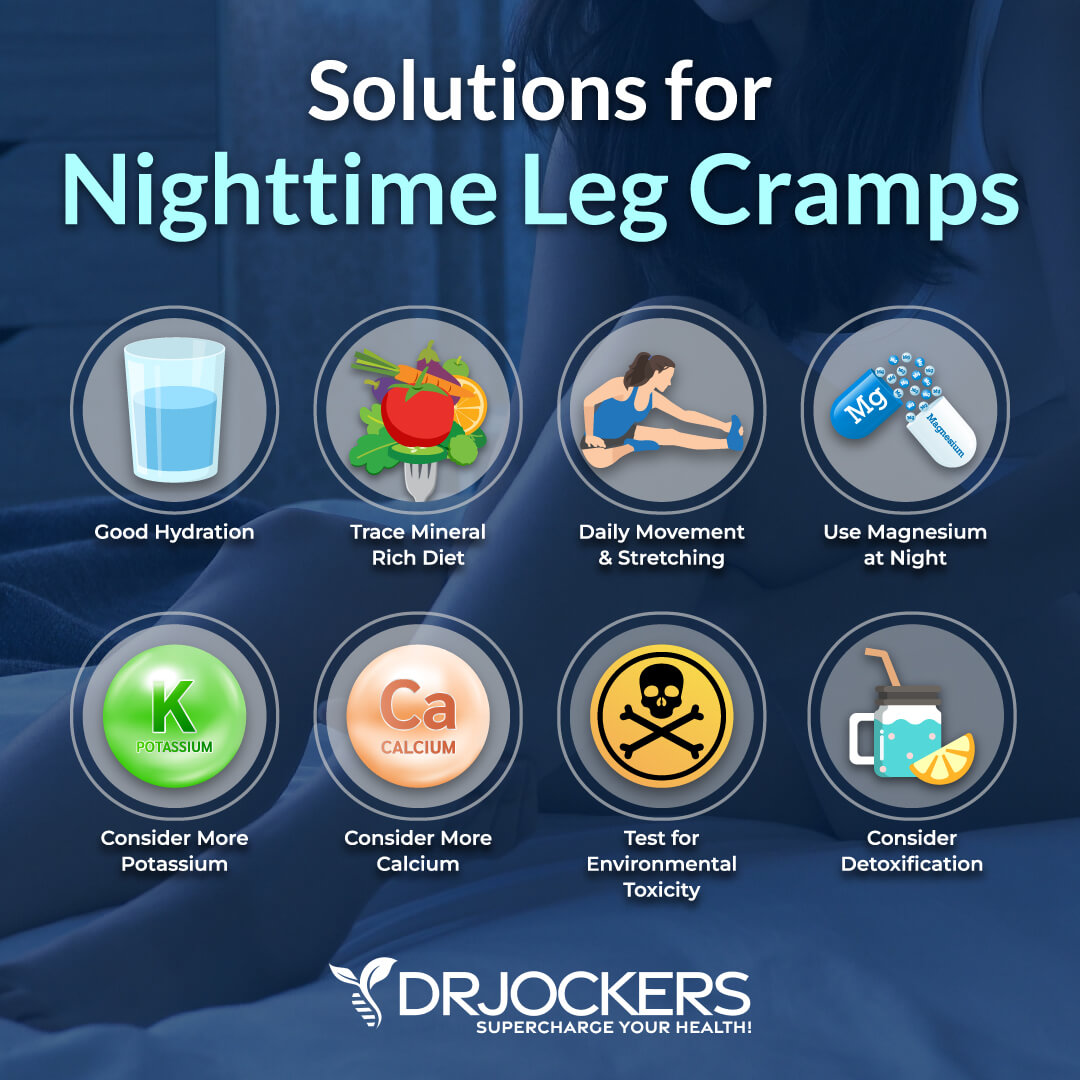
Sign #4: Itchy Red Rashes, Acne & Blemishes
Several skin problems are associated with nutritional deficiencies. Skin conditions such as psoriasis, eczema, severe acne, and even skin pigmentation disorders may have you trying to alleviate the problem with skin moisturizers and anti-inflammatory drugs.
However, understanding the cause will help you find a cure. Learning if your skin blemishes are caused by a lack of adequate nutrients in your diet may be the first step to fixing your problem. The most common nutritional deficiencies with these conditions include fat soluble nutrients such as vitamin A, vitamin D, and vitamin E. Also, omega-3 fatty acids and gamma linoleic acid (GLA) are key for healthy skin.
Most people wouldn’t realize this, but if I don’t consume a healthy diet and have a lot of stress, I develop a lot of skin blemishes. To remedy this, I load up on foods rich in vitamins A and E, such as grass-fed butter and vegetables, and I supplement with a high-quality omega 3 supplement with added GLA each day. Now, I have outstanding skin and I plan to keep it that way for life!
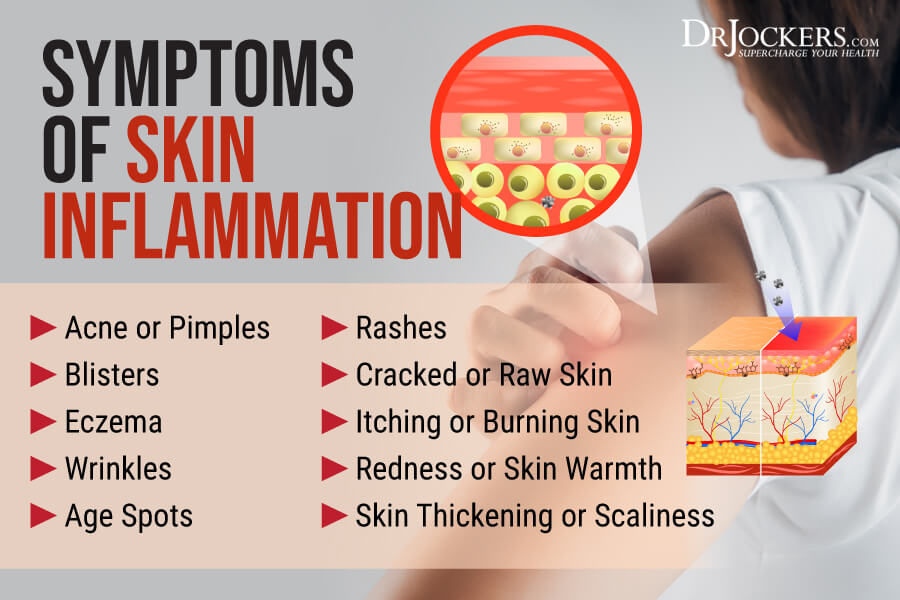
Related Deficiencies
The World Health Organization (WHO) recognizes that vitamin A deficiency is a public health concern affecting more than half of the globe, and vitamin D is virtually an epidemic, considering 90% of the population is deficient in this critical nutrient (13, 14).
Most people are also deficient in the long-chain omega-3 fatty acids EPA and DHA, as well, and this can result in more inflammation in the skin and sebum glands and the development of acne.
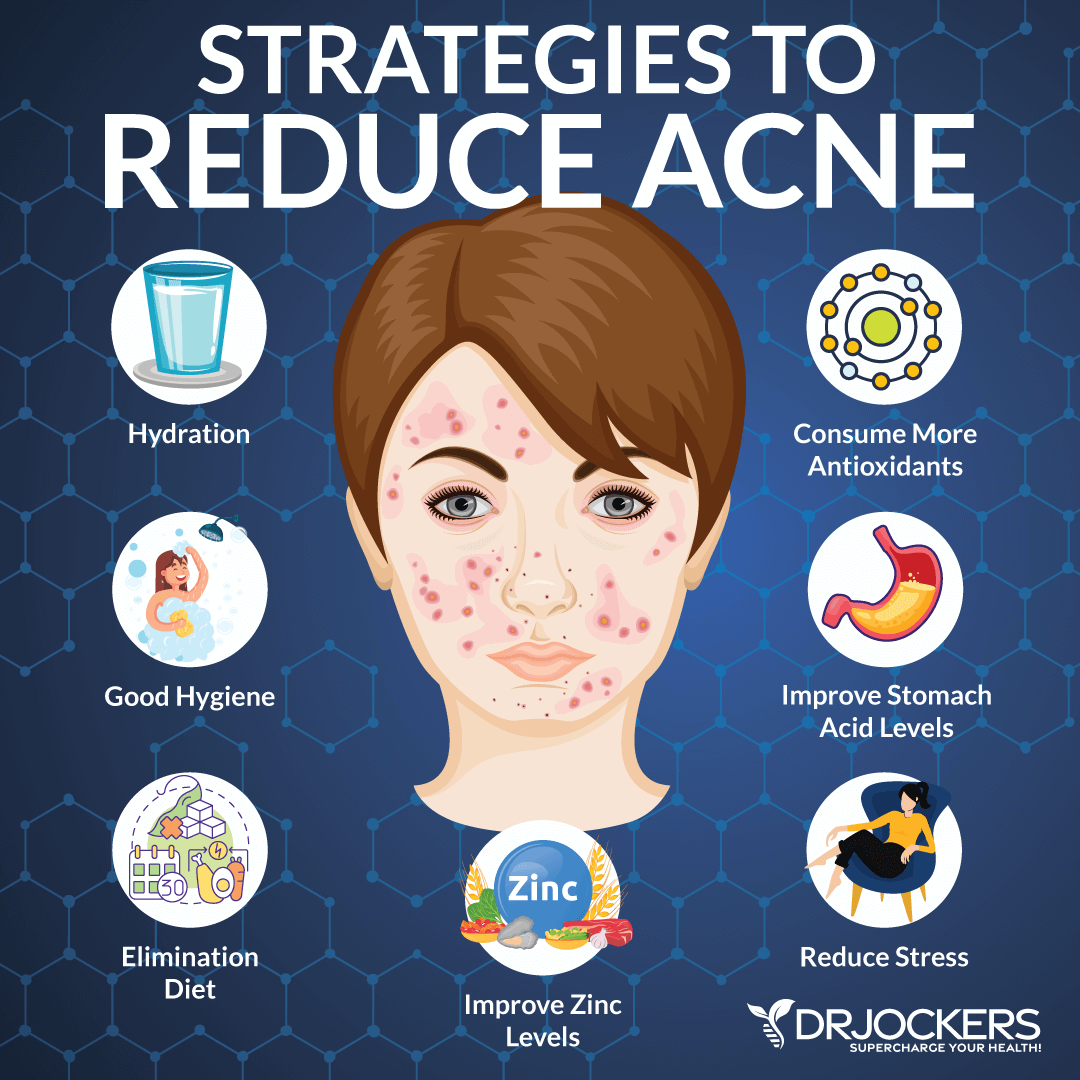
Vitamin A Deficiency
Vitamin A, referred to as retinol in skin care products, is critical to be maintained at normal levels. Vitamin A is necessary for a healthy immune response in the skin and can inhibit inflammatory skin reactions like persistent acne.
Perhaps more severe than acne, vitamin A supports the integrity of cells that make up epithelial tissue, and a lack of vitamin A in the diet can cause dry, scaly skin that stimulates premature aging. (19)
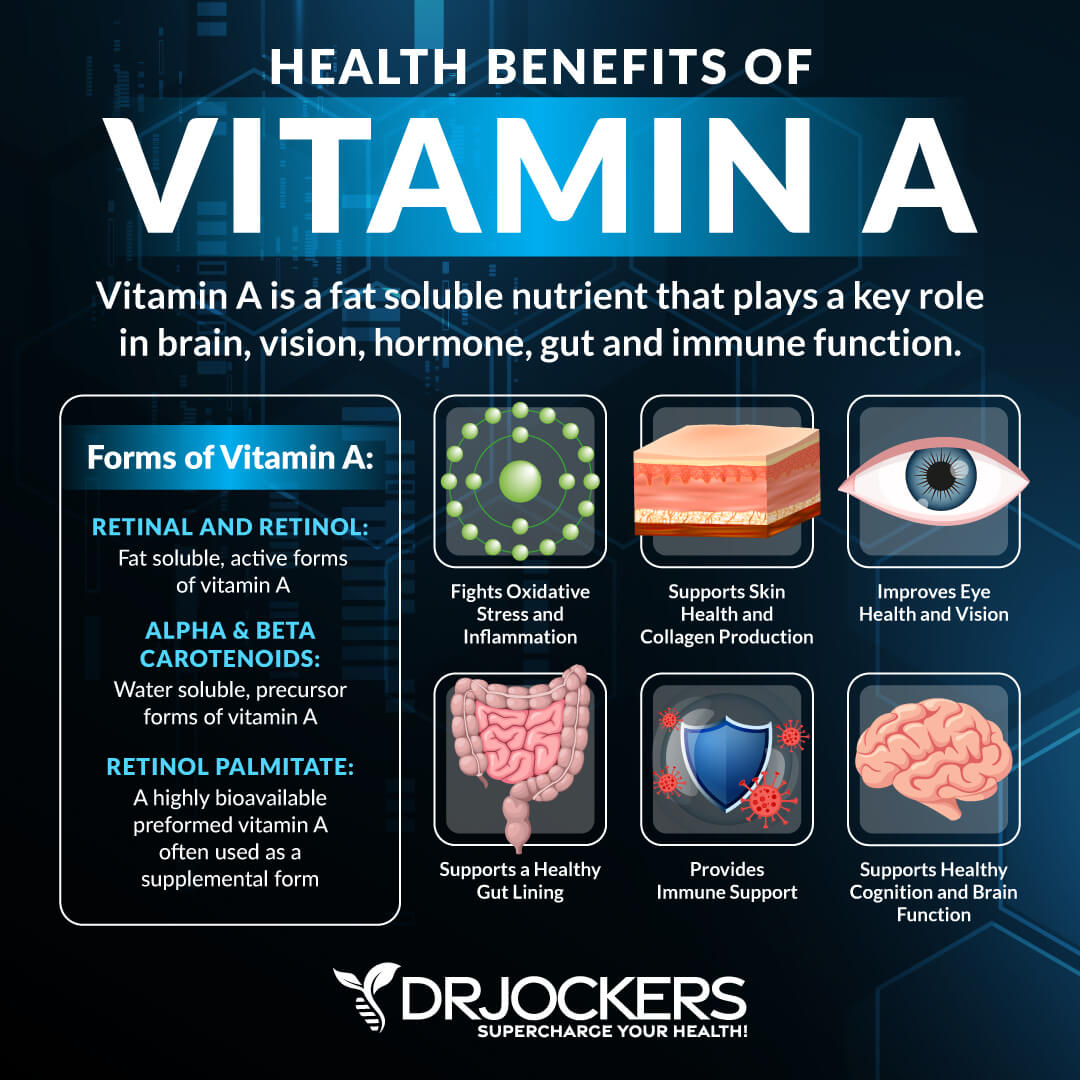
Vitamin D Deficiency
The Vitamin D Council summarizes the latest news and research on vitamin D and estimates that individuals who experience skin issues like eczema are commonly found to be deficient in this nutrient (15). Furthermore, studies show that individuals with the lowest levels of vitamin D exhibit more severe eczema symptoms than those with higher concentrations (16).
Eczema involves inflammation of the skin and can appear anywhere on the body. A rash can be characterized by dry and flaky skin, but can also be more severe, causing extreme redness that is itchy and looks infected. Similar to eczema, psoriasis causes skin irritation and redness that is commonly treated with synthetic vitamin D3 ointments (17).
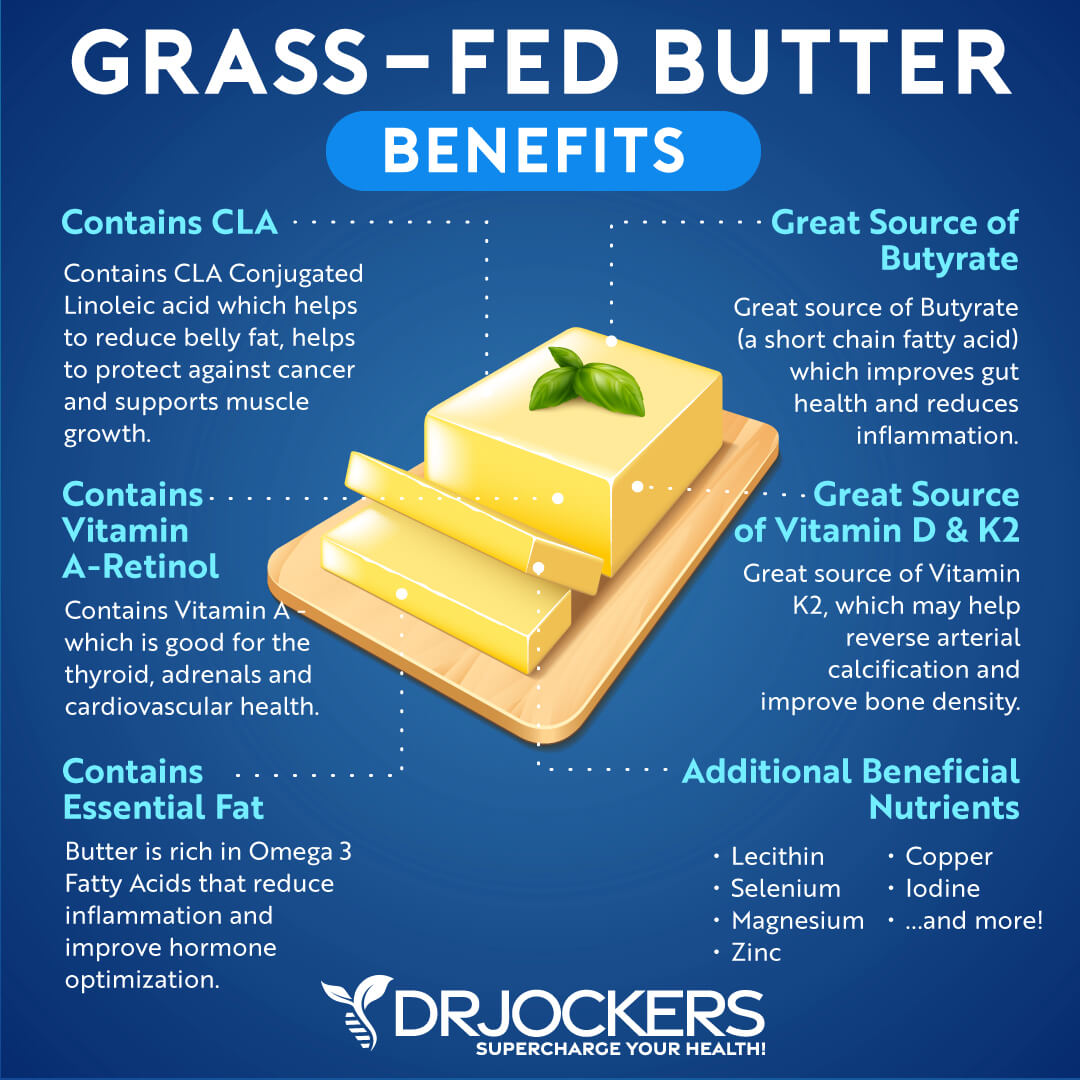
Remedy
Foods rich in vitamin A include liver, organic eggs from pastured chickens, dark green vegetables, carotenoid-containing produce like carrots and sweet potatoes, as well as milk from 100% grass-fed cows. One of my favorite sources of vitamin A is grass-fed butter or ghee. I recommend using these generously each day.
Although the sun is the primary origin of vitamin D synthesis for your skin, grass-fed butter is also high in vitamin D. You may consider supplementing your diet with cod liver oil as this provides a healthy balance between vitamin A and D. (18) Be sure to to keep all sugar out of your diet and look out for other triggers like dairy proteins and gluten.
I would also recommend adding probiotics to support gut health and applying coconut oil and gentle essential oils like lavender to your face to help improve the skin’s microbiome and reduce inflammation on the surface of the skin. You can also find non-toxic facial cleansers with agents like activated charcoal that can be very helpful.
A great source of the long-chain omega 3 fatty acids EPA and DHA is through a purified fish oil. I personally recommend Nordic Naturals Cod Liver Oil because it has high amounts of fat-soluble vitamin A, 1000 IU of vitamin D, and a healthy dose of EPA and DHA.
#5: Abnormal Sensations in Hands or Feet
Have you ever experienced tingling in your toes? How about a numbness in your hands or the sensation of pins and needles in your feet? These minor and seemingly insignificant symptoms can be a sign of a serious health problem. Symptoms may be slow to develop but become more severe and lead to serious health consequences over time.
Related Deficiencies
Vitamin B12 & Folate (Vitamin B9): Since the intrinsic relationship between vitamin B12 deficiency and disease was first recognized in 1849, researchers have fought to understand the many metabolic roles this vital nutrient plays in maintaining health. Vitamin B12 is involved in a key reaction that regulates nerve function, supports DNA synthesis, and helps regulate specific amino acid levels, like homocysteine, from becoming toxic. (21, 24)
Folate is another B vitamin involved in similar neurological pathways. A deficiency in vitamin B12 and folate is associated with inflammatory conditions throughout the body. However, severe problems that can arise from a vitamin B deficiency, like Crohn’s Disease, may be masked by less problematic symptoms early on. One of these early body signs is neurological damage manifested as numbness or tingling in areas of the body, such as hands and feet. (21)
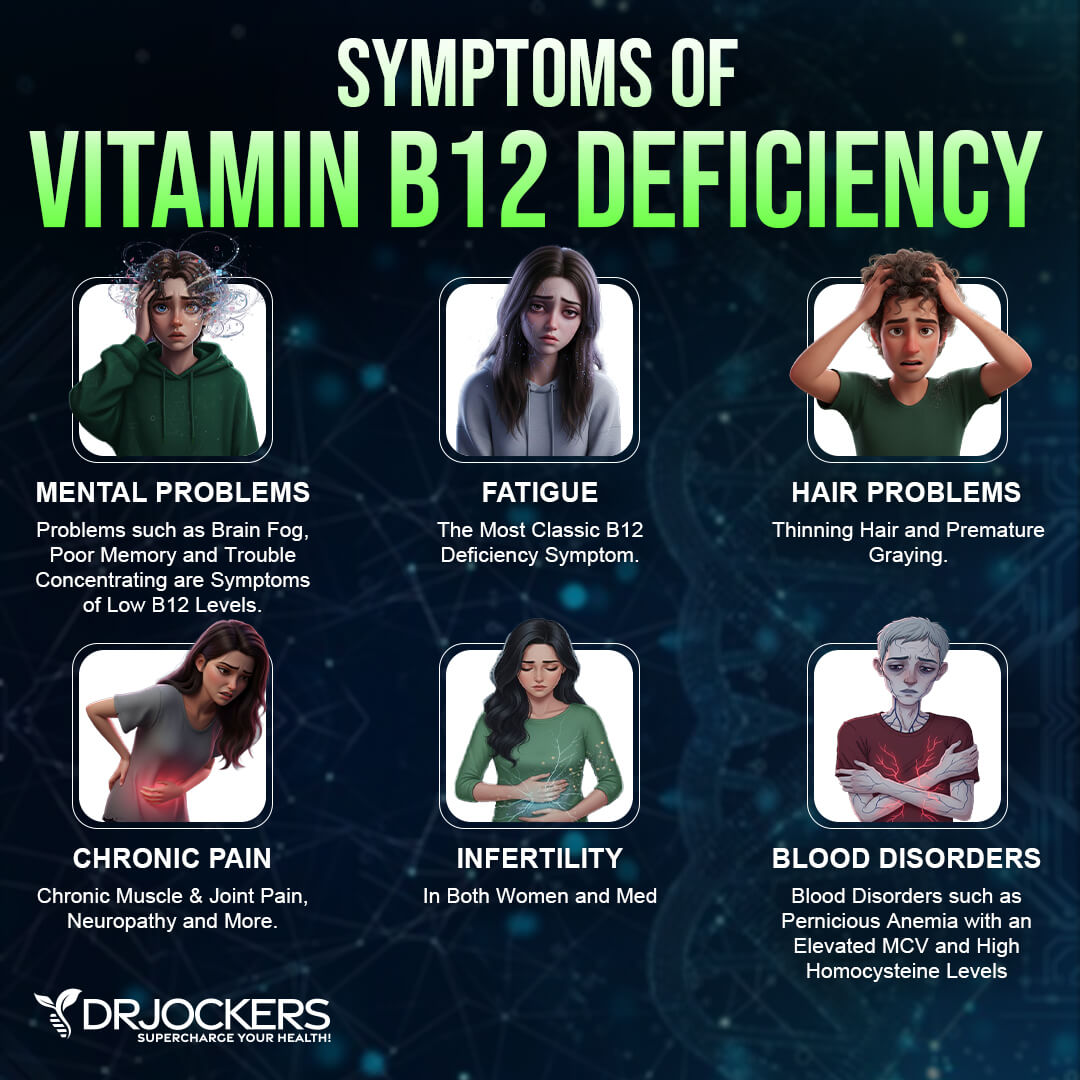
Vitamin B6: Although vitamin B6 is present in many food sources and many people in developed countries have healthy levels, there are risk factors that can increase vitamin B6 deficiency. For instance, vitamin B6 deficiency is more common in the elderly, women, and smokers.
Even in a margin of the population, vitamin B6 deficiency is still a concern as it assists in many metabolic functions, including neurotransmitter function and the metabolism of carbs, fatty acids, amino acids, and organic acids. (22, 23)
Vitamin B6 is also involved in nerve conduction and impulse due to its many interactions with other nutrients (23). A lack of vitamin B6 can trigger nerve damage if gone untreated over a long duration.
I routinely test for B6, folate, and B12 status as well as other key B vitamins through an Organic Acid test that you can find here.
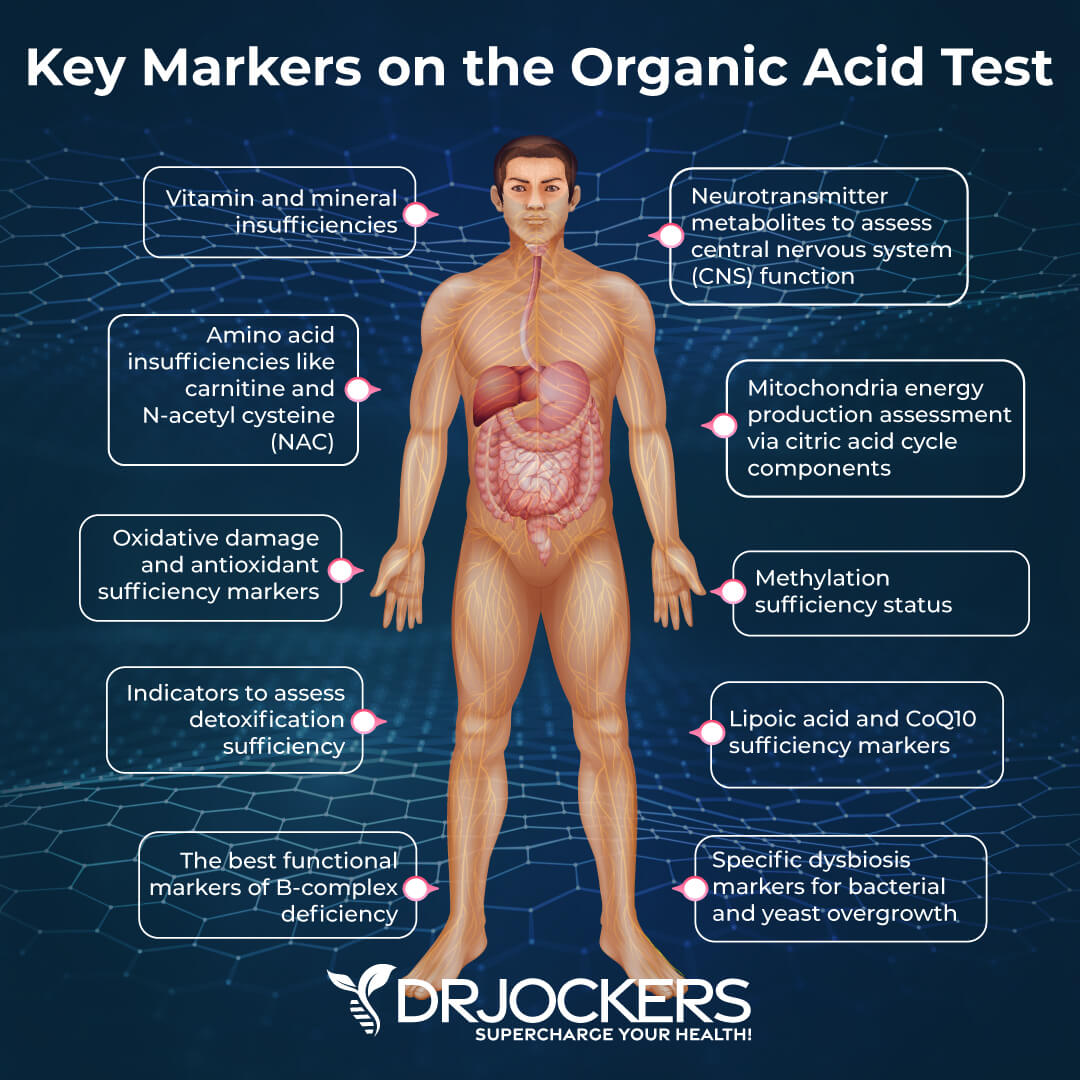
Remedy
Foods containing a complex of B vitamins are primarily of animal origin, such as meat, eggs, dairy, and poultry. This is why vegans and vegetarians are at an increased risk of vitamin B deficiency (20). Although vitamin B12 is bound in protein in animal products, vitamin B6 can be obtained from meat as well as green leafy vegetables.
Some individuals have genetic issues, such as pyroluria, that cause them to need much higher B6 levels. Other people have a dysbiotic gut, and the bacteria are unable to produce adequate B6 levels. This is where fermented foods can be especially helpful sources of highly absorbable B6.
If I see low B6, folate, and B12 levels on lab testing, I will use B Strong, 1 cap – 2x daily for mild deficiencies. Some individuals will need a methylated B12 that bypasses the digestive tract and gets right into the bloodstream. For these cases, I use B12 Power, 1 cap – 1x daily away from meals for individuals with moderate nutritional deficiencies and 1 cap – 2x daily for individuals with severe B12 deficiencies.
Reasons for Nutritional Deficiencies
There are several reasons why someone may have nutritional deficiencies. These include a diet that is low in micronutrients and high in sugar and processed foods. The lesser-known reasons include low stomach acid and leaky gut syndrome, which cause poor nutrient absorption.
Additionally, poor blood sugar balance and chronic stress deplete key nutrients and lead to nutritional deficiencies. All of us have had one or more of these factors for a period of time in our lives, and it is quite possible you are struggling with one right now that is contributing to nutritional deficiencies in your body.
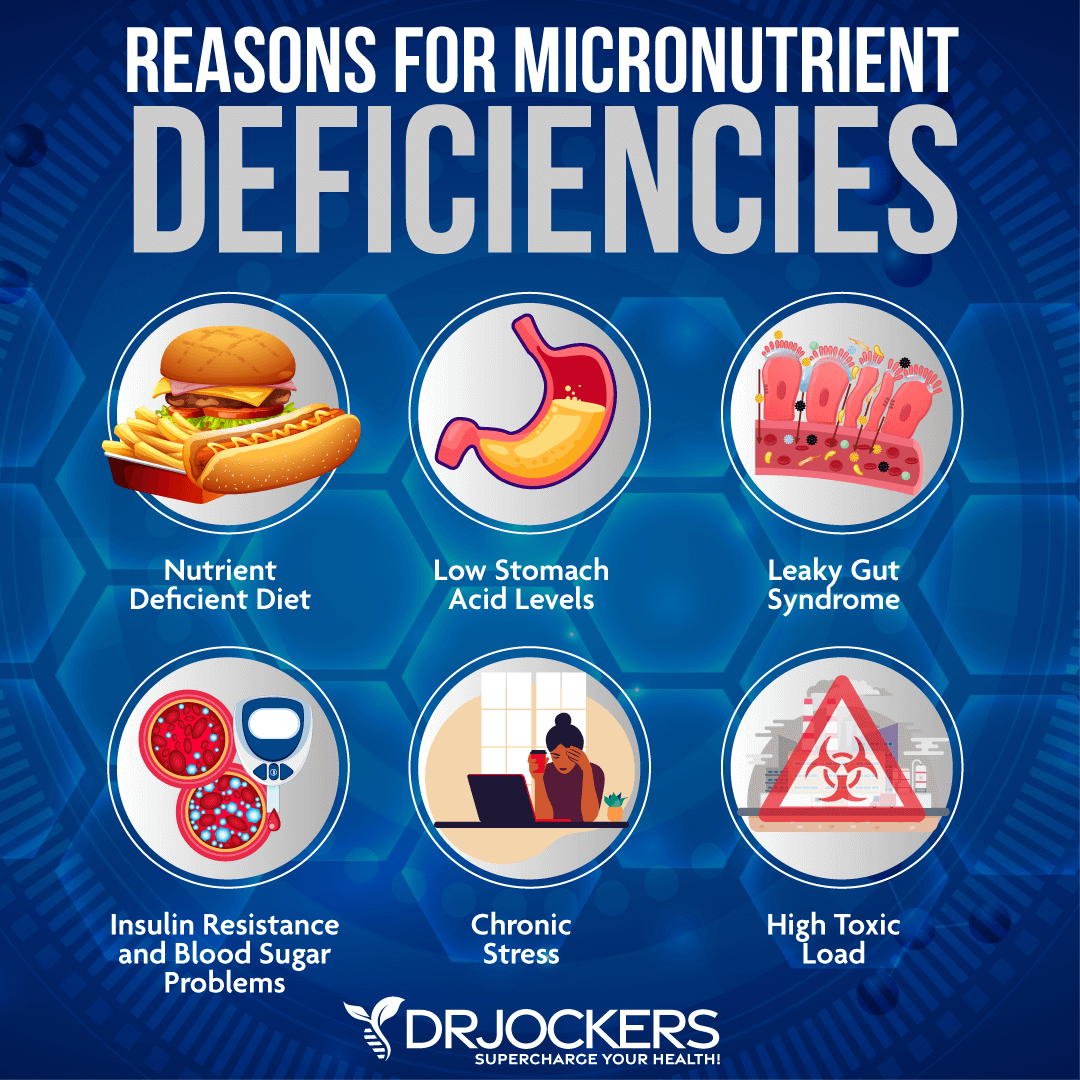
1. Poor Diet
Making wise dietary choices is the first step to fine-tuning the nutritional deficiencies that your body is facing. Without optimal nutrients, the body is less able to absorb and utilize what nutrients it consumes, which increases the risk for systemic dysfunction.
Experts recommend consuming lean protein to meet your body’s nutritional needs for both essential and non-essential amino acids. Non-animal proteins are high in folate and fiber but generally lack essential amino acids.
Healthy fats such as coconut oil, grass-fed butter, ghee, avocados, and olive oil should be used generously. Cod liver oil is an excellent source of vitamin D as well as omega fatty acids.
Key Nutritional Tips:
Above all, consuming a wide variety of nutritional antioxidants sourced from all the colors of the rainbow in fruits in vegetables can help prevent nutritional deficiencies. Consider eating a superfood every day, and choose to have a salad as one of your meals. Be sure to choose organic produce to consume foods with the highest nutritional density.
AVOID: Processed and commercialized meats should be avoided altogether. When choosing to eat red meat, make the choice to consume only grass-fed red meat. You should also consider the following dietary recommendations:
- Avoid unhealthy fats, high in trans-fats or partially hydrogenated oils, found in butter substitutes, ice cream, vegetable oil, and generally all processed foods.
- Avoid, if not limit, your intake of fermentable carbohydrates from processed foods.
- Avoid simple sugars, including high fructose corn syrup and table sugar, which feed pathogenic bacteria and create metabolic disturbances.
- Do choose to drink purified water, probiotic beverages like coconut water kefir, and herbal teas in place of your soda, juice, and energy drinks.
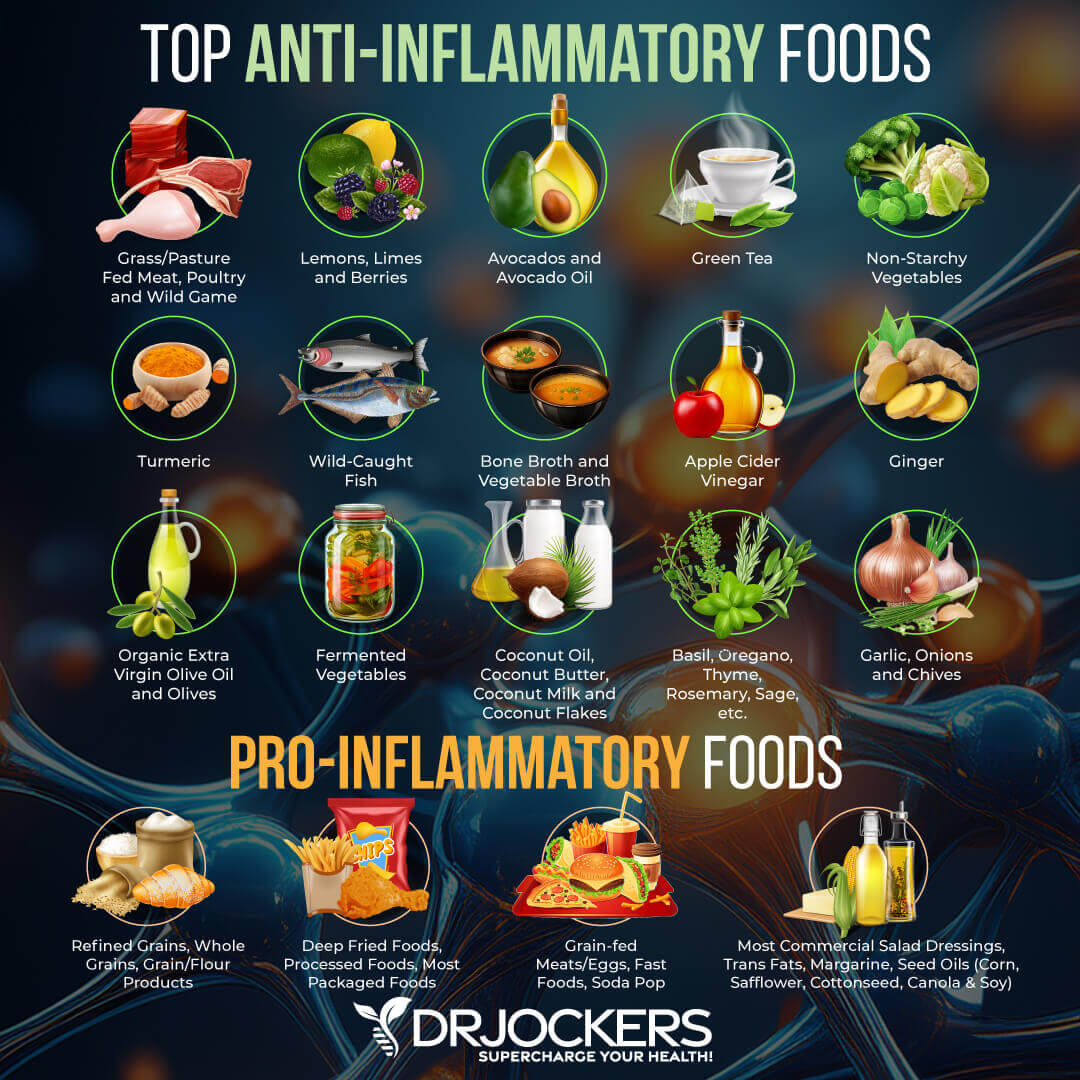
2. Chronic Stress
Every day, stress to the body can create a vicious cycle which can cause nutrient deficiency and induce symptoms of stress such as depression and anxiety, which further depletes the body’s storage of vital vitamins and minerals (8). Especially as you age, the body becomes less efficient at absorbing nutrients, and detoxification pathways are further hindered.
Nutrients are one of several environmental influences that can either support or impede epigenetic gene expression. From this perspective of gene regulation, diseases may not only be inherited but also modified and expressed through changes in an individual’s environment. Researchers have recently begun to show how the intake of nutrients and their bioavailability are essential to maintaining health, especially under stressful conditions. (25)
The stress response is another influencing factor for epigenetic gene regulation, which reduces the availability of bioactive food compounds and uses up antioxidant supplies. Quality nutrition is critical to combating the damage to cells and tissue in the body resulting from stress responses.
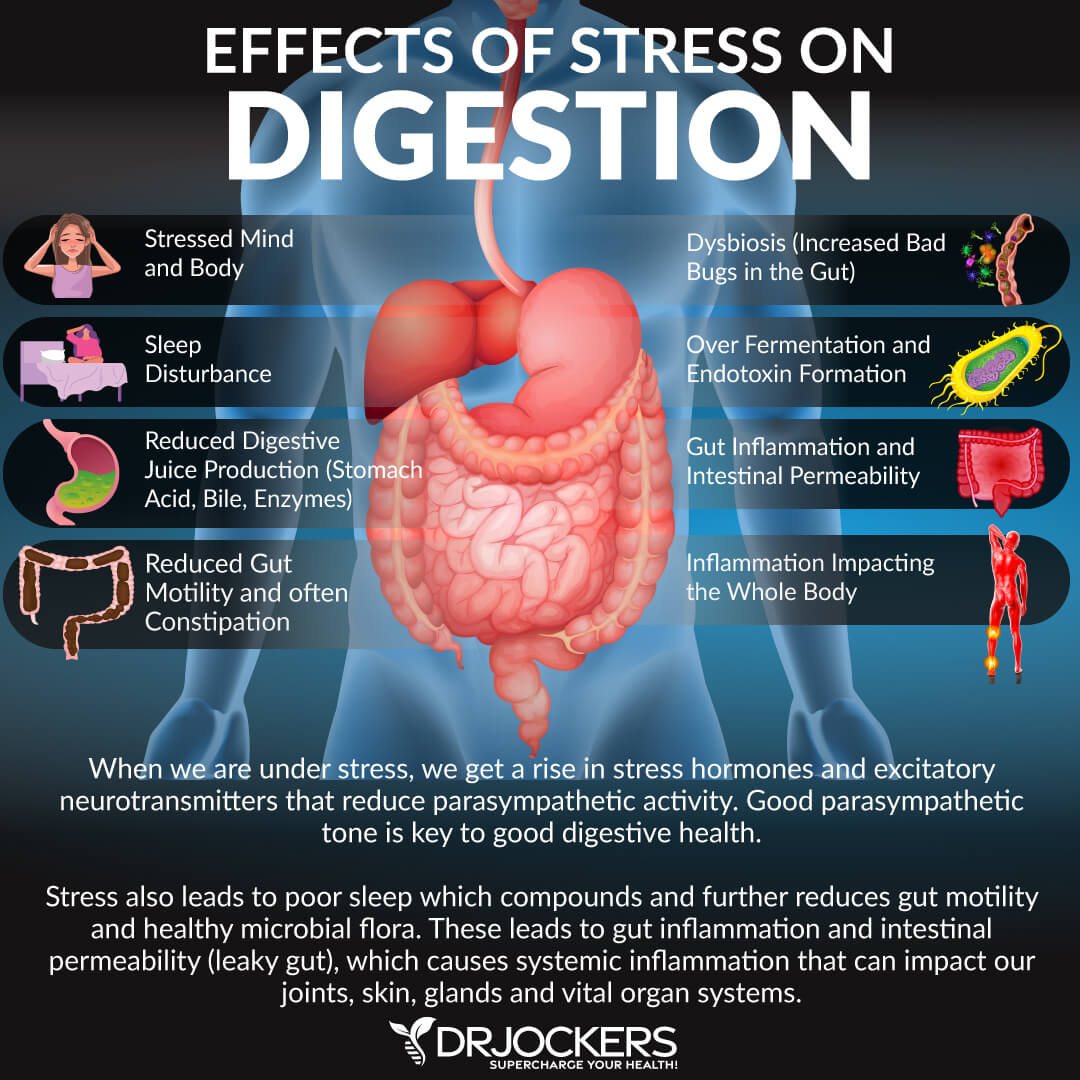
3. Digestive Disturbances
The health of the gut microbiota is a significant contributor to the body’s ability to effectively absorb nutrients from food. Different species of bacteria inhabit the gut, providing a variety of benefits for health. Amongst these duties is their ability to break down food into micronutrients, which can be easily taken up and transported to cells (27).
The gut is a common site further impacted by chronic stress. Stress creates inflammation in the gastrointestinal tract, reducing the ability of hair-like projections called microvilli to absorb nutrients (26).
Inflammatory gut conditions further provide an environment for carcinogenic bacteria like Candida and E. coli to thrive (28). These bacteria can be found in small concentrations resulting from food contaminants, but can promote intestinal infection and nutritional deficiencies resulting from their overgrowth. Consuming probiotic and prebiotic foods such as sauerkraut, pickles, and kimchi can help keep these harmful bacterial colonies at bay (29).
If you are not producing enough stomach acid, you may not be optimally absorbing nutrients such as B12, zinc, and iron. A chronic inflammatory stomach condition known as atrophic gastritis is a major cause of the lack of vitamin B12 absorption in the gut. This results in the loss of glandular secretions and a reduction in enzymes that metabolize nutrients, such as pepsin. (21)
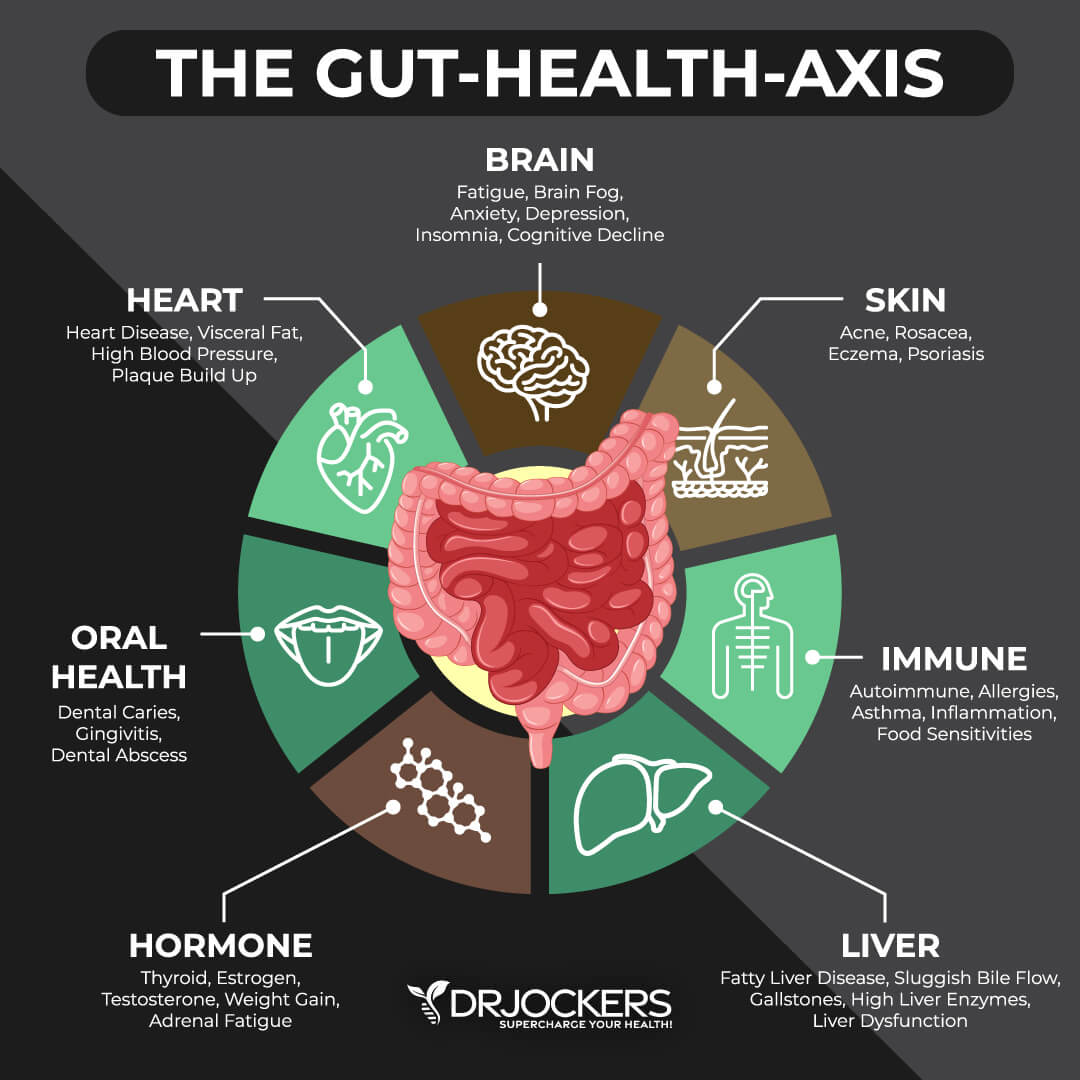
How to Test Micronutrient Levels
The best way to test micronutrient levels is with the NutrEval Plasma Test® is both a blood and urine test that evaluates over 125 biomarkers and assesses the body’s functional need for 40 antioxidants, vitamins, minerals, essential fatty acids, amino acids, digestive support, and other select nutrients.
NutrEval is the most comprehensive functional and nutritional assessment available. It is designed to help practitioners identify root causes of dysfunction and provide a systems-based approach to help patients overcome chronic conditions and live a healthier life.
The NutrEval Plasma Test
The NutrEval plasma test can help with the identification and mitigation of nutritional risk factors that contribute to many degenerative disease conditions. It is helpful for people with a family history of chronic disease and certain high-risk groups that are more susceptible to vitamin, mineral, and antioxidant deficiencies.
This test is also beneficial for proactive people who want to prevent health issues with early detection of nutritional deficiencies, as well as those with no apparent specific disease who need insight into generalized complaints and treatment options.
If you want to work with a functional health coach, I recommend this article with tips on how to find a great coach. On our website, we offer long-distance functional health coaching programs. For further support with your health goals, just reach out—our fantastic coaches are here to support your journey.

Inflammation Crushing Ebundle
The Inflammation Crushing Ebundle is designed to help you improve your brain, liver, immune system and discover the healing strategies, foods and recipes to burn fat, reduce inflammation and Thrive in Life!
As a doctor of natural medicine, I have spent the past 20 years studying the best healing strategies and worked with hundreds of coaching clients, helping them overcome chronic health conditions and optimize their overall health.
In our Inflammation Crushing Ebundle, I have put together my very best strategies to reduce inflammation and optimize your healing potential. Take a look at what you will get inside these valuable guides below!
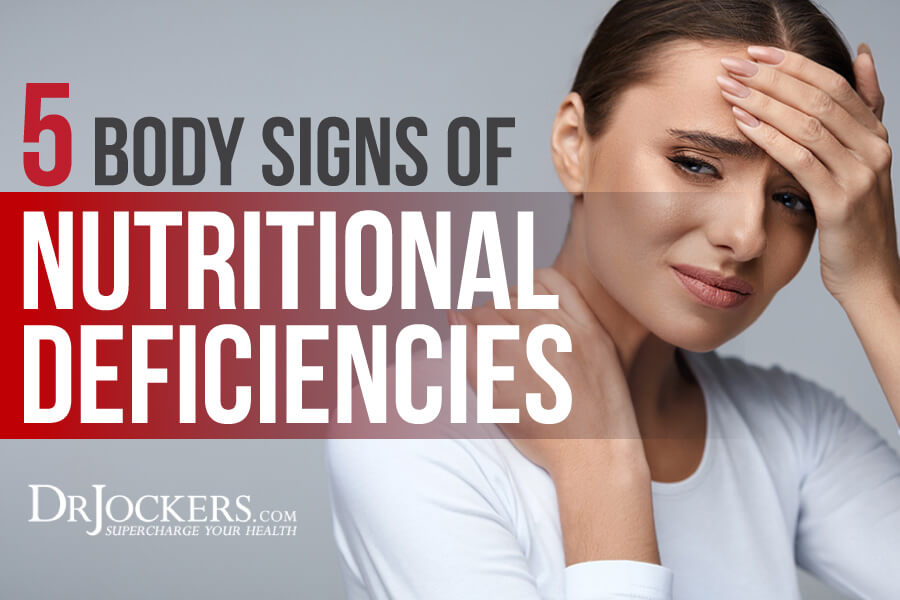


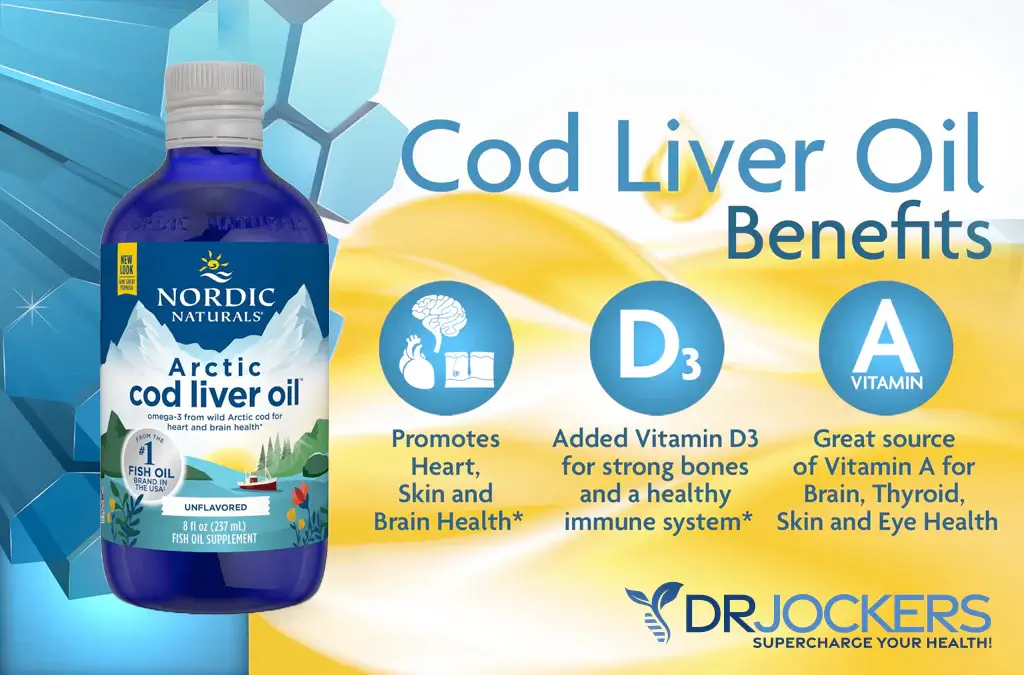

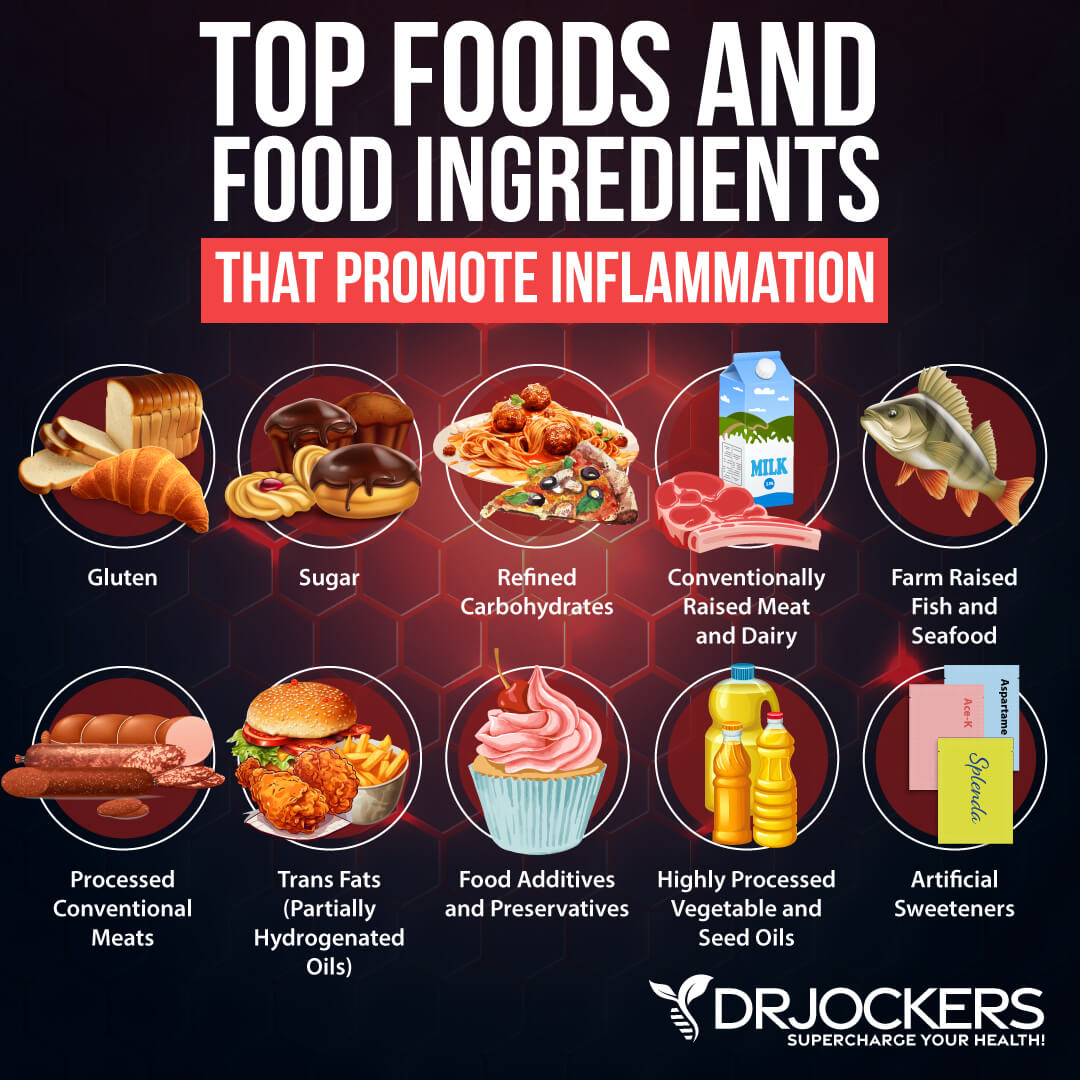
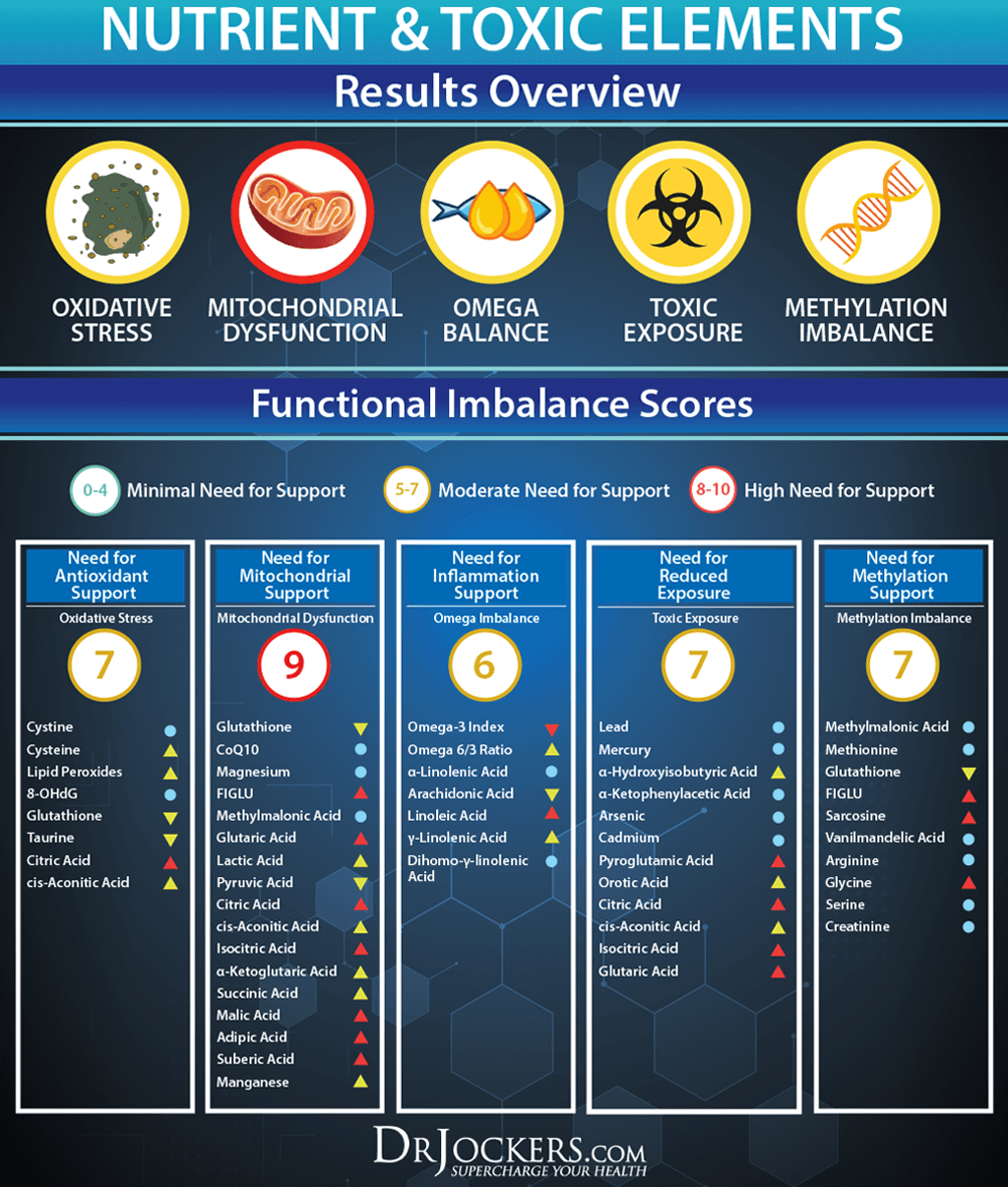





Do you have any information on what L-Cysteine and Glutamic Acid can do for our Health?
I was advised by a friend who advised me to take this. He said it cleanses out Toxins and helps the Brain.
I would recommend reading this article Angela! https://drjockers.com/glutathione-levels/
Dr Jockers
I wish to thank you for so many informative articles you do for free.
Having taken supplements for over 30yrs i have a pretty good knowledge on this subject and at age 83yrs without issues affecting me ,this is through people like your self who have given me your knowledge.please keep going because people with intelligence will surely gain
peter aris
Hi Doc,
This article has really blown me away!!!
I’ve always loved all your articles, but this one is just so detailed, so precise, & describes soooooo many common ailments, I’m going to print it out & keep it in a file next to my right elbow at my computer desk, for easy reference.
Thankyou again.
Liz
Hey Liz! Thanks for reading, I’m glad you found value in it!
Brilliant content connecting dots – love it and all the information you provide.
Pamela
Thanks Pam! Blessings to you!
VERRRRY INTERESTING!! Thank you!
Is avidin in the yolk or the white? The reason I ask is I love eggs over easy but have thinning hair. Could this be a reason? …my yolks aren’t cooked? Thank you in advance for all the knowledge!!!
Hi Gwen,
Avidin is in the white and it does a good job of binding up biotin. You may want to supplement with vitamin B complex and extra Biotin. We no longer get much of our Bs from our microbiome or our foods. Additionally, our toxic world requires us to increase our fluid consumption, which further depletes our Bs.
It is in the egg white. If you are eating the yolks than you shouldn’t have an issue here. The hair thinning is most likely a thyroid or female hormone issue. https://drjockers.com/13-hair-problems-mean-regards-health/
Thank you Dr,for lengthy explanation of this article. It is very enlighting. Am particularly interested in the Damaged nerves. What do you suggest will help heal the nerves. Around the area of the lower spine through the waist and the hips and the thyhs
Glad to hear this was helpful. Here is a helpful article for you: https://drjockers.com/neuropathy/
I would like to have printed it out———–TOOOOOOOOOO LARGE=$% PAGES
We have a print button on the top of each article. If you want to print it without images, simply copy and past the narrative into Microsoft Word or Notepad and delete the images to reduce the quantity of pages printed.
I LOVE the print option at the top of each article! This makes it easy to keep them intact for referencing. Thank you!
Great to hear that Molly!
For Leg Cramp protocol, Why coconut water? (I avoid ferments because I am healing from histamine intolerance and not yet ready to eat ferments).
Why avocado? I’m wondering if I can substitute anything for that one.
For Dark leafy greens, what are the nutrients you’re after? Some greens are high in oxalates and I’m considering a carnivore diet–any advice for mineral supplementation on carnivore?
What food would you recommend for an ESR 31mm/hr for a 59yrs old woman. Thanks.
I would recommend working on reducing inflammation levels. https://drjockers.com/5-ways-reduce-inflammation-quickly/
Dr Jockers, I am Celiac, have ongoing constipation, many food sensitivities, Exogenous Pancreatic insufficiency and painful Fibromyalgia. Do u sell a good absorbable multi-vitamin ?
Hey Terri, so sorry to hear about this. I would recommend making shakes with our Gut Healing Protein which has a highly absorbable multi-vitamin in it along with many other nutrients to reduce inflammation in the gut. https://store.drjockers.com/products/gi-cleanse-protein
My 71-yr old husband has experienced severe nerve pain in his jaw for the past 6+ months. It’s interesting to see that several of the vitamins & minerals mentioned support optimal nerve health. Do you think it’s possible he has a deficiency? If so, what would you recommend as “next steps” for him?
Yes it is possible. I would recommend finding a functional health coach to do a deeper dive into his health history and lab work. https://drjockers.com/functional-nutrition-tips-to-find-a-great-health-coach/
Hi Dr. Jockers,
First, great job!
What would you recommend to have my taste back? Thank you!
Manon
Zinc is the most important thing for senses like this. I would take 40-60 mg of zinc glycinate in divided dosages with meals.
I am low in B12 and D which I take suppliments for but I am way too high in B1, what would cause this? How do I correct it? My doctor says to stop my multivitamin so I will also lose everything else in it just to take care of the too high B1.
Sorry to hear this Linda. I would recommend finding a functional health coach to do a deeper dive into your health history and lab work. https://drjockers.com/functional-nutrition-tips-to-find-a-great-health-coach/
Thank you for the great article!
Can I ask what about acne on the back?
Which nutrient deficiency could be a cause of that, is it the same as for face skin?
Hello Brigi, that is often associated with a zinc deficiency and/or high insulin and testosterone. For women, this is associated with PCOS. https://drjockers.com/pcos-support-strategies/
My husband has multiple health issues due mostly to Agent Orange exposure in Vietnam. He is diabetic, has had open heart surgery, and has been battling foot wounds for several years. He complains about losing his hair, itchy skin, and intense pain in his feet. He has had blockages in his legs opened to try to help his wounds heal, but so far there isn’t much progress. He has taken many natural supplements and vitamins and minerals for years, including beet root, pycnogenol , hawthorn berry, cinnamon, etc, but I’m not sure of the quality of the supplements because, for the most part, they are sourced in China. I can’t get him to want to eat better and he doesn’t have much of an appetite to start with except for starchy food. He is more than willing to take the next new supplement as long as it is in pill form and because of that, he takes wild lettuce to pick up the slack where his morphine is not effective. Can you suggest something that will help him? Thank you.
So sorry to hear about this! I would recommend the following
Bioactive Carbon Metchem – 1 cap – 3x daily
Bioactive Carbon Minerals: 10 drops in water – 2x daily (morning and midday)
Glutathione Boost – 2 pumps – 2x daily before meals
You can find these all here and use the coupon code JOCKERS10 at checkout to save 10% https://store.drjockers.com/
Is it simply a myth to think teenagers with acne are just going through hormonal changes, and it has nothing to do with diet and/or deficiencies? Interested to know for my teenage niece. Thank you!
Glad this was helpful for you! Here is another helpful and deeper dive into acne: https://drjockers.com/10-things-acne-means-health/
I have lpr inflammation of my throat that they say is the pepsin that rises in the form of gas and lodges in the vox box and when I eat acidic foods the pepsin is activated and causes inflammation, could it be that this is a problem of bad intestinal bacteria or a les that does not work well
Sorry to hear this! Here is a helpful article on Silent Reflux – LPR: https://drjockers.com/silent-reflux/
I was overdosed with a chemo face cream 5FU by my dermatologist . I didn’t even have cancer ! It left me with several chronic conditions . The fight or flight is daily and terrible . I’ve tried emdr , biofeedback , tai chi on and on. The therapists dismiss
Me after a year. It also left me with peripheral neuropathy , fibromyalgia, profound hearing loss with background noise due to an agent in the 5FU cream , constant flight or flight and either Parkinson’s or essential tremor . I was so active and now can hardly do anything . 3 trips to Mayo Clinic and $60,000 later . It only happens to 1% of the population . 22 dr appts , 5 ER and 1 urgent care . Drs. Could not DX it was so rare . I had to put 2 and 2 together and was confirmed by my oncologist and neurologist who said it was exactly like I had been infused . What to do next ? I’m also working with a naturopath doctor of pharmacy . What to do ? I’m miserable everyday and have no life . The fight or flight is so debilitating plus the tremor l
So sorry to hear this! Praying for your healing!
Thank you for your excellent info. I always read your posts! Am appreciative of all you do. Dawn
Thank you Dawn!
Good post! Thanks for the information as nutritional deficiencies are leading to many severe problems in people like depression, stress or anxiety as well as improper cell growth.
GOOD DAY – THANKS FOR THESE MARVELOUS ARTICLES AND VALUABLE INFORMATION – KEEP UP WITH YOUR GOOD WORK – MUCH APPRECIATED
Platinum is being used, in patience with aneurisms. They make it into a fine thread and ball it like yarn to put in to the aneurism. I have had this procedure done on October 6, 2005, on the left side of my brain. I am worried about the effects it is having. And wanted to try zeolite clinoptilolite to detox, but I am unable to get info on if this is safe to use. Or will this dissolve the platinum causing another rupture?
If not do you have another way to detox from the platinum. As you can imagine I will have to detox for the rest of my life, and I need a safe method.
Yes here is a helpful article: https://drjockers.com/toxins-weaken-immunity/
Hello Dr Jockers,
I need some help for my husband. He did prostate surgery 7 months ago due to cancer and he has no erection since the doctor said it will come back but wants him to take a needle. He is hard bent on doing that. Is there any herbs or vitamins you would suggest. Thank you. He is 65yrs old with no other concerns
Sorry to hear that! Yes, we have a very helpful article here: https://drjockers.com/erectile-dysfunction/
Stripes and ridges length-wise on nails – what deficiency do those indicate.
Here is a helpful article where we review this: https://drjockers.com/10-nail-problems/
Hi. I’m 45-yrs-old. What kind of medical condition(s) causes a jolting-type sensation in the centre of the chest? Sometimes this jolting sensation has the power to momentarily take my breath away. It can momentarily sometimes leave me feeling dizzy with a momentary sensation of losing consciousness. Possible triggers include:
Stress
Fear
Over-excitement and high adrenaline from watching action films and accompanied by pulsating energy running up my spine.
The constant editing and verbal re-reading of my written work and which also leads to a constant dry throat which requires tonnes of water.
High heat burning sensation within my body after running electrical appliances. TV, laptop, PlayStation 3 etc… (no Wi-Fi)
Organic coffee and possibly organic dark chocolate macadamias.
Besides removing the triggers above, it would be good to know what foods to eat and what supplements I could take to try and stop these sometimes scary jolting sensations in my chest. I also sneeze two or three times a day in my backyard bedroom which is always accompanied by a runny nose despite running a Winix Zero+ 5-Stage Air Purifier. If only I was given a name to what this medical condition is, I could then research it on Sayer Ji’s website and find better ways to try and heal myself. I don’t trust seeing the doctor. All they prescribe is big pHARMa poison. Toxic x-rays, no thanks.
That is a great question. Some deficiencies that come to mind here are magnesium, zinc and vitamin B6. Look into pyroluria as well: https://drjockers.com/pyroluria-common-unknown-disorder/
I really enjoyed this piece because it’s comprehensive yet summarises all your other articles on nutrition
Thank you!
I love your presentations with all of the graphs and visual aids! Thank you so much for all that you’ve shared with us!
I have a question about your vitamin B product B Strong. I’ve been convinced for years from various articles and webinars that methyl folate is superior to methyl folic acid. Would you please explain why your product has the folic form?
Many thanks!
It contains 5-Methyl Folate or 5-MTHF which is what you are referring too when you say methyl folate. It doesn’t contain synthetic folic acid.
As usual, you give amazing information! The one issue I have is that you seem to group all carbs together when you just say, “Reduce carb intake,” instead of delineating simple carbs should be totally avoided. I know you promote keto, but it’s very hard on my liver; I think I have an inherited weakness with it. I don’t eat flour or sugar but otherwise, I think eating lots of veggies is actually good for my health. Plus, God gave us the food that grows from the ground, so it’s not inherently bad. It’s the changes that man has made, such as GMO corn, etc. Many docs disagree on the health merits of keto vs vegetarian, etc, and I don’t believe it’s a one size fits all.
Yes focus on good carbs – in particular nutrient rich fruits and vegetables.
I’ve read most of the comments and agree with many. Wow! Your comprehensive, simplified, concise presentation is so refreshing. With all of the archaic and “new” information, Western vs Eastern techniques, and just conflicting information from different physicians and professionals, this article is like the safety net that helps the non-medical Joe have a grasp and a concise reference for the many concepts presented to him. I can’t thank you enough! Keep it up.
Thank you so much!
The article was super great!!! Thank you very much.